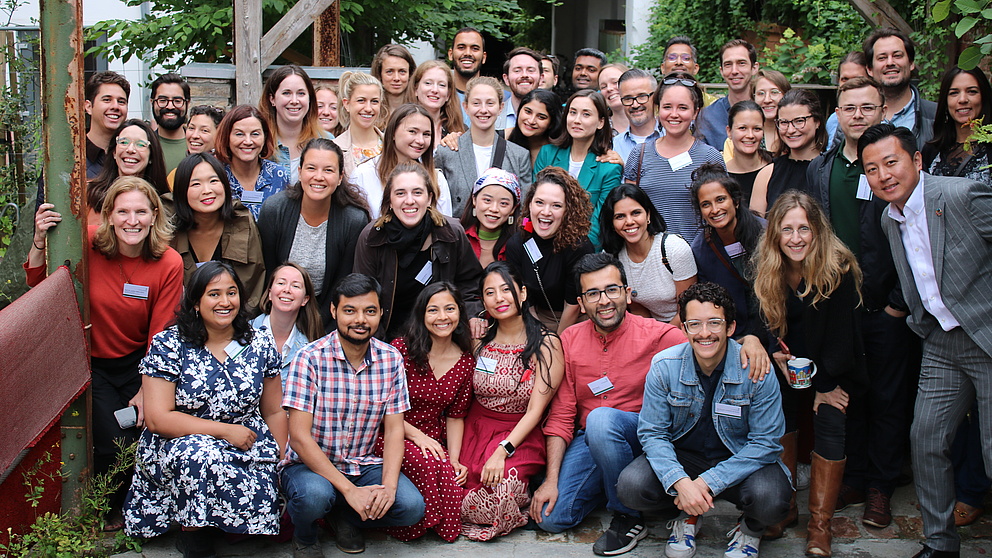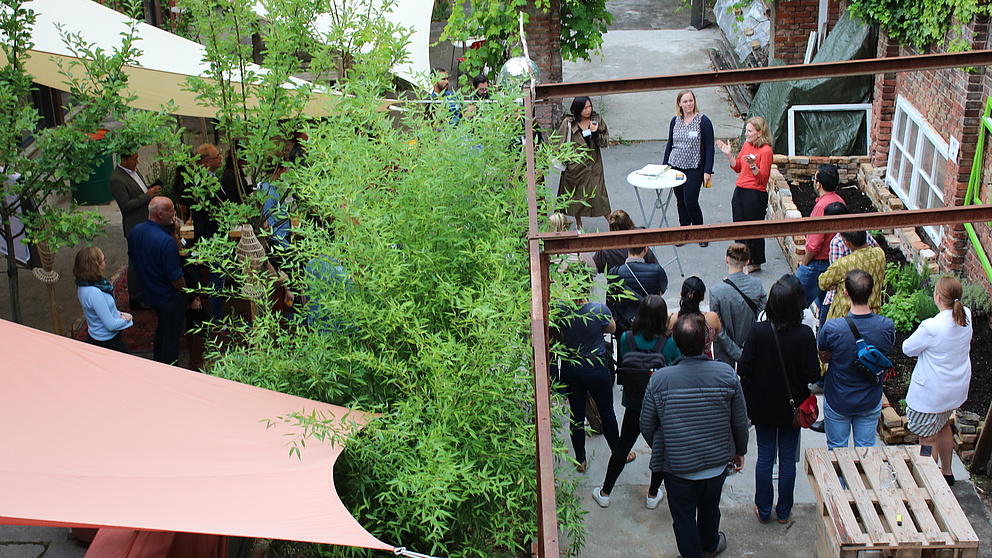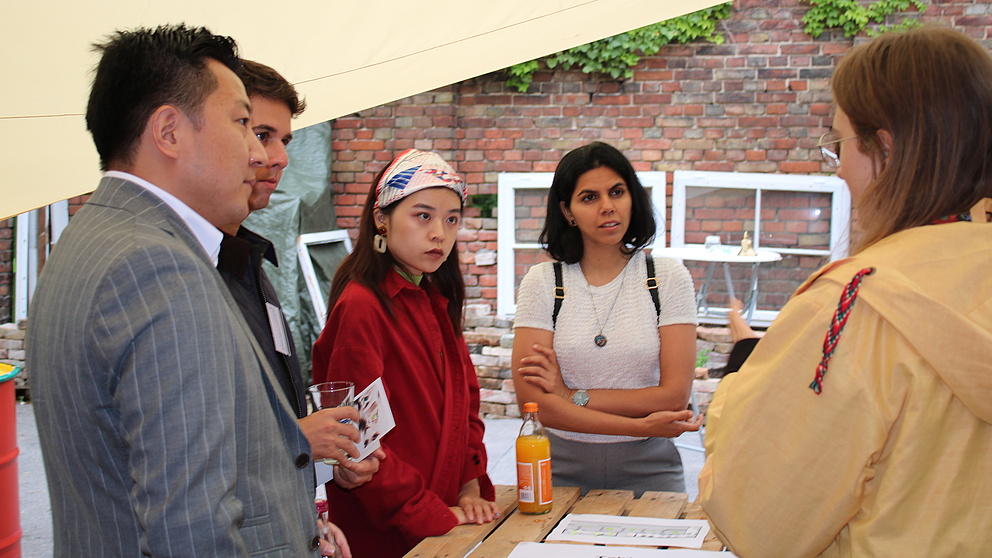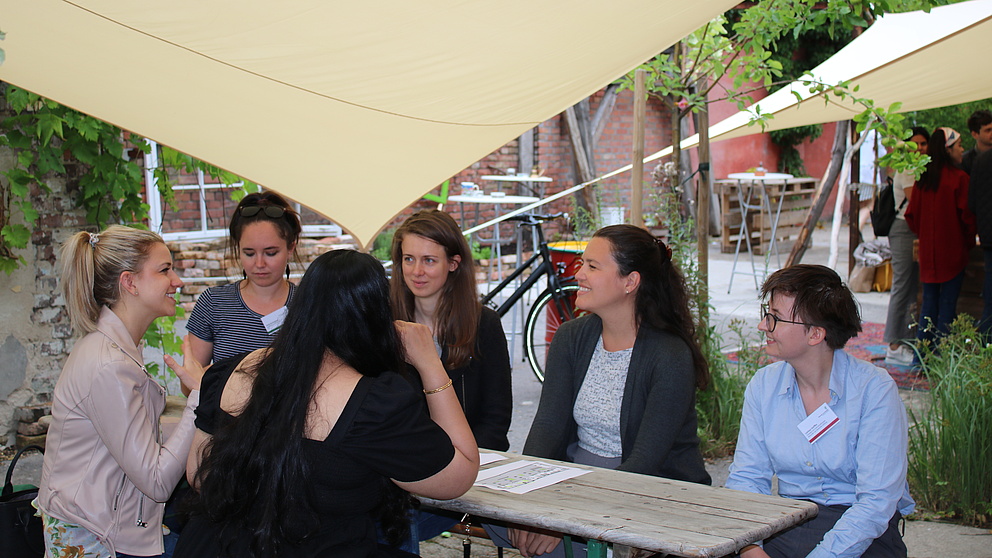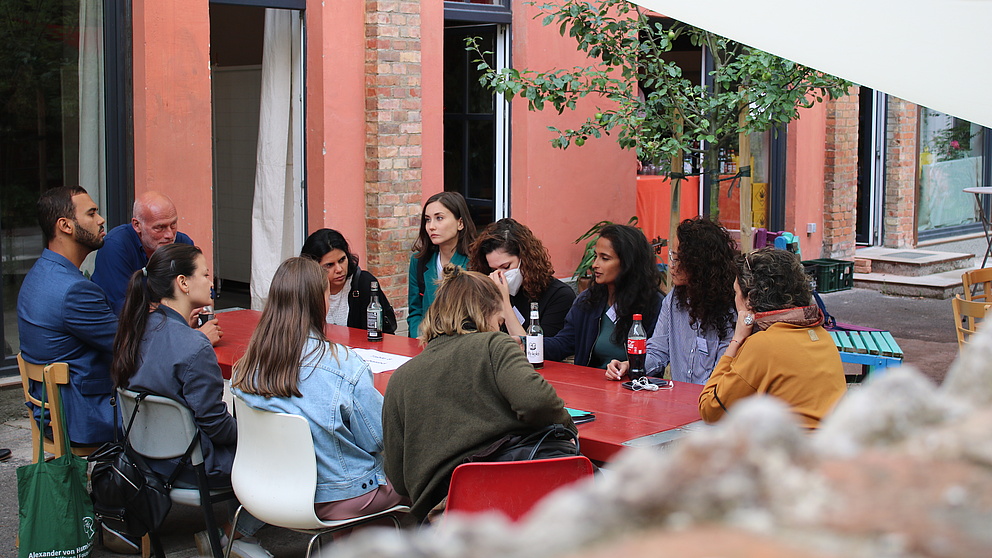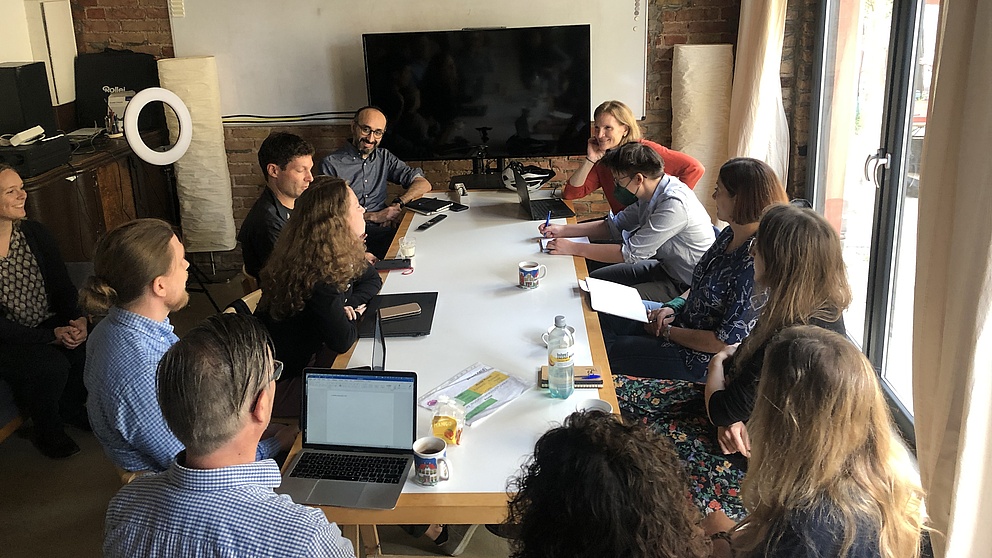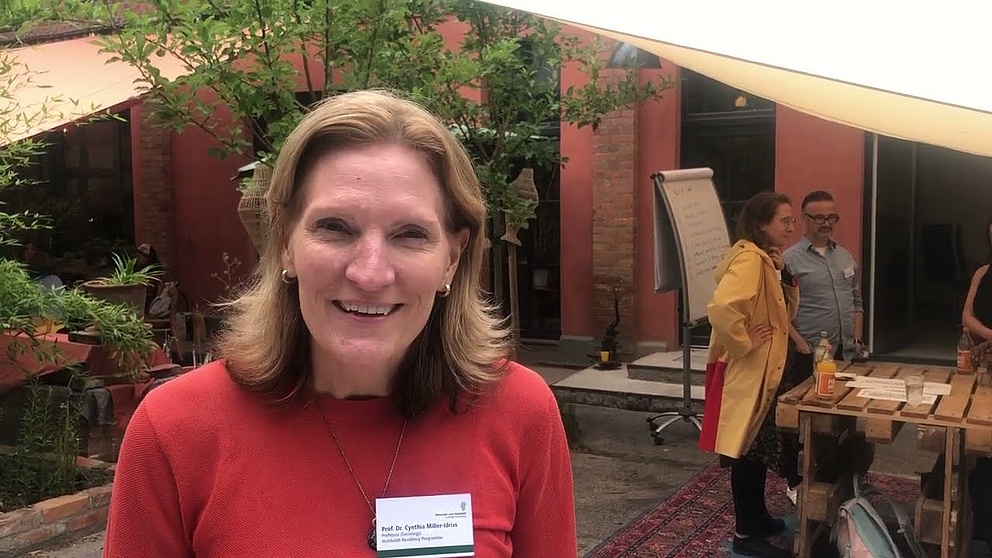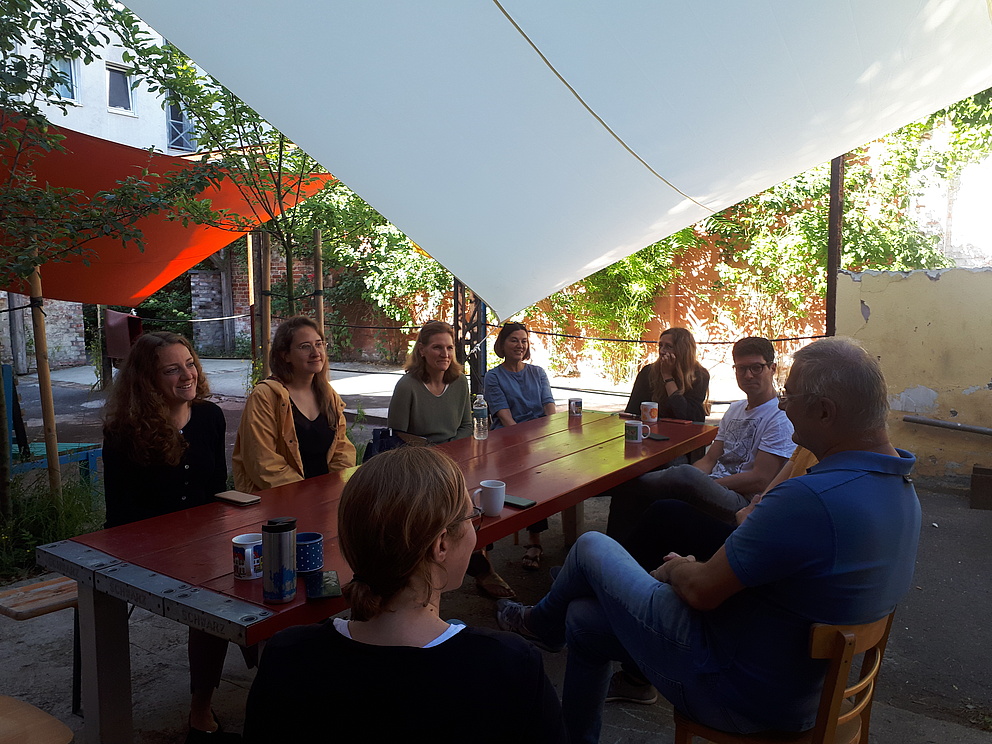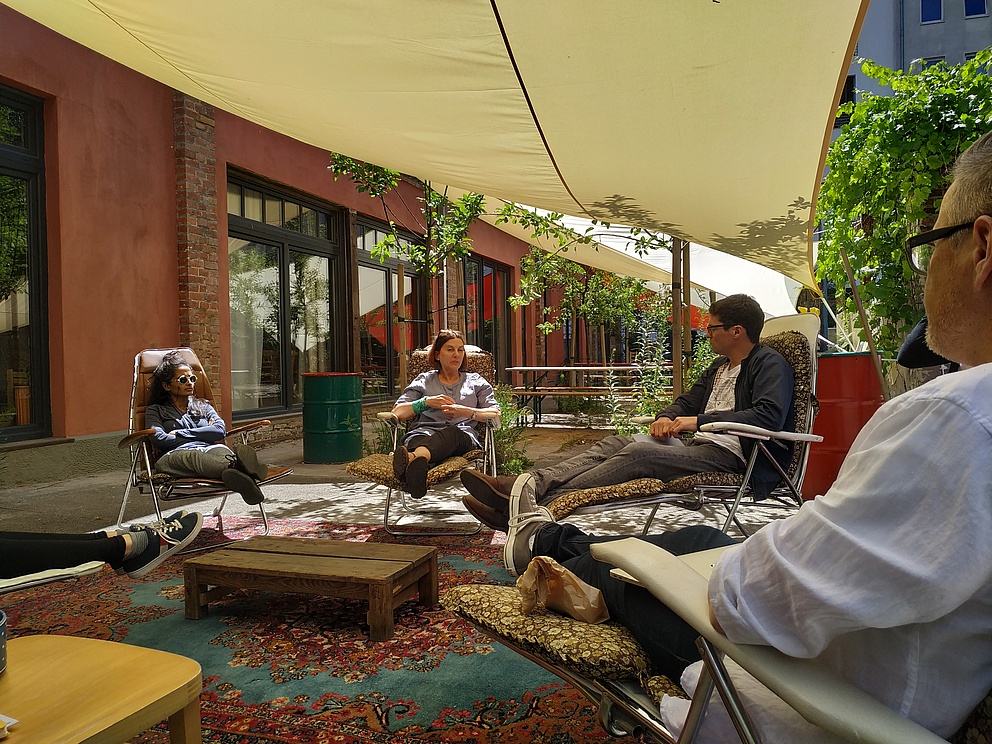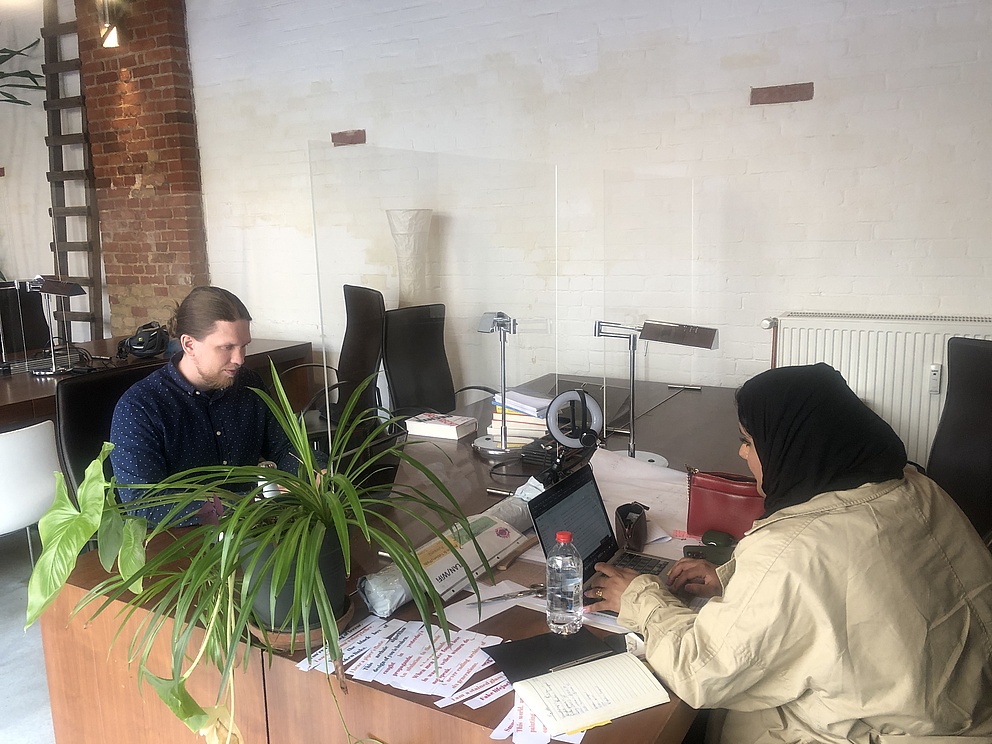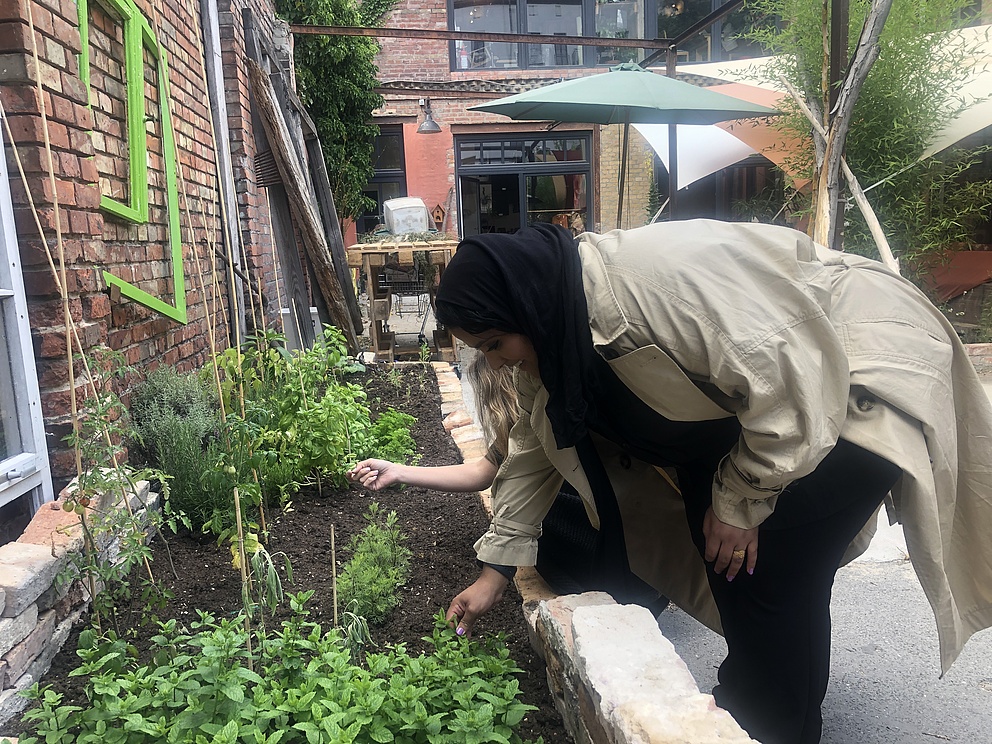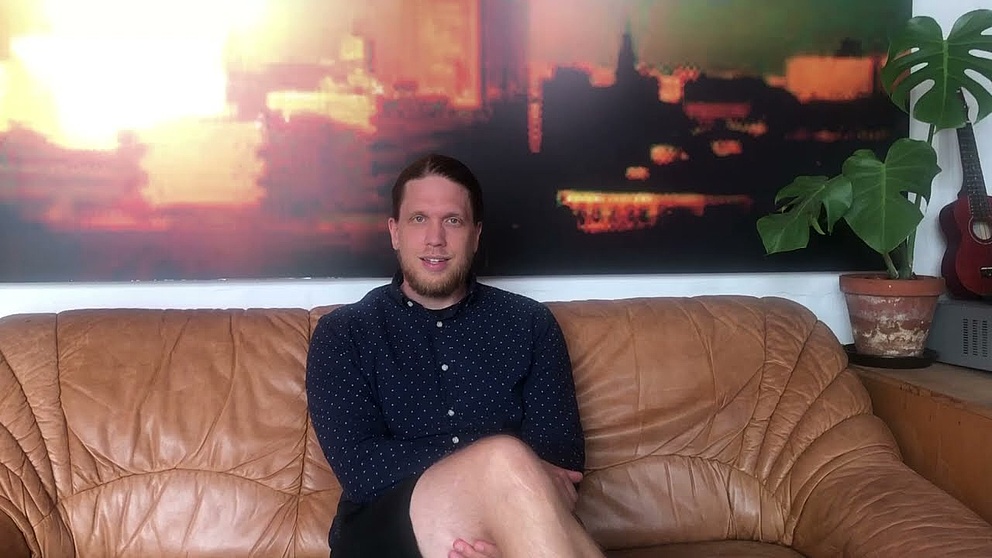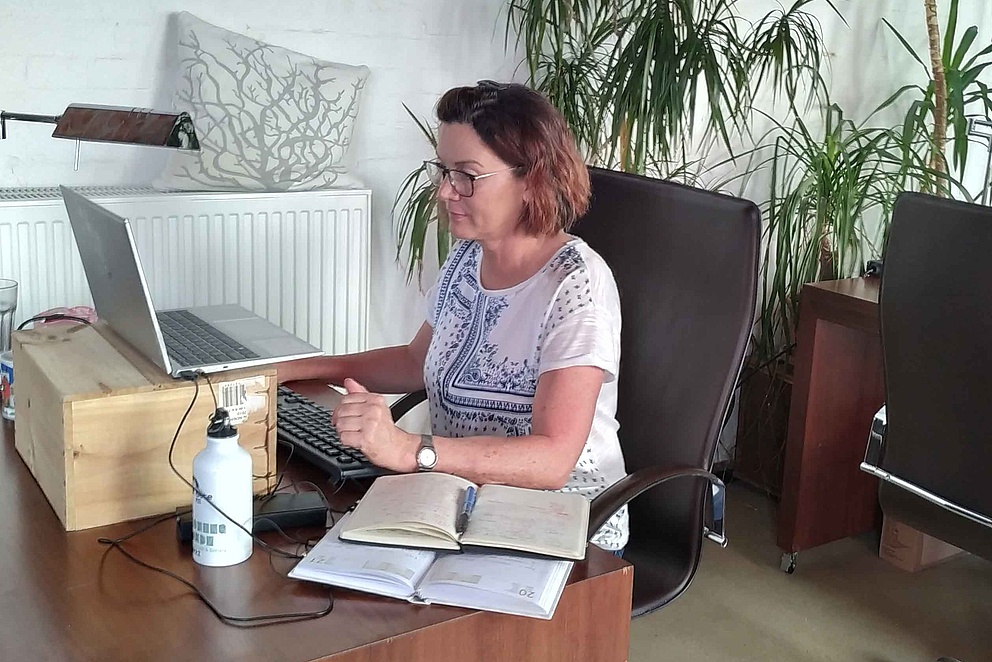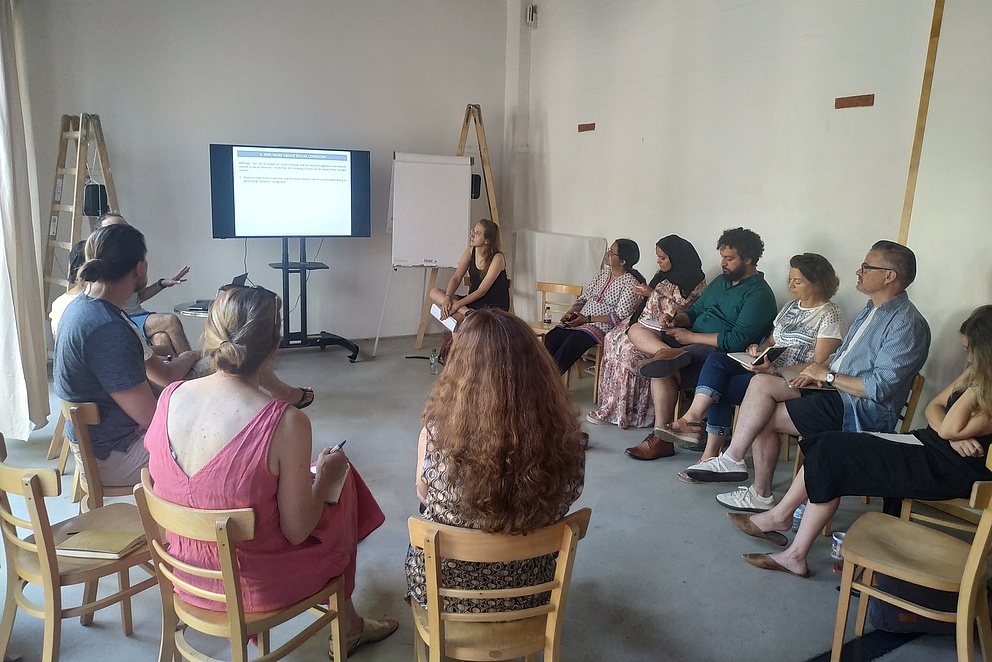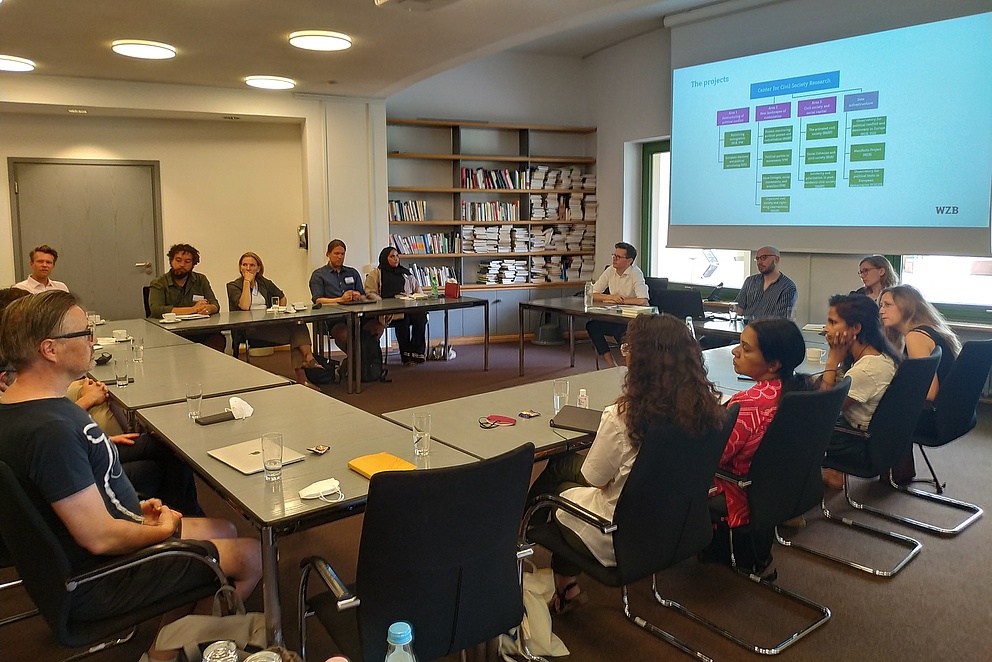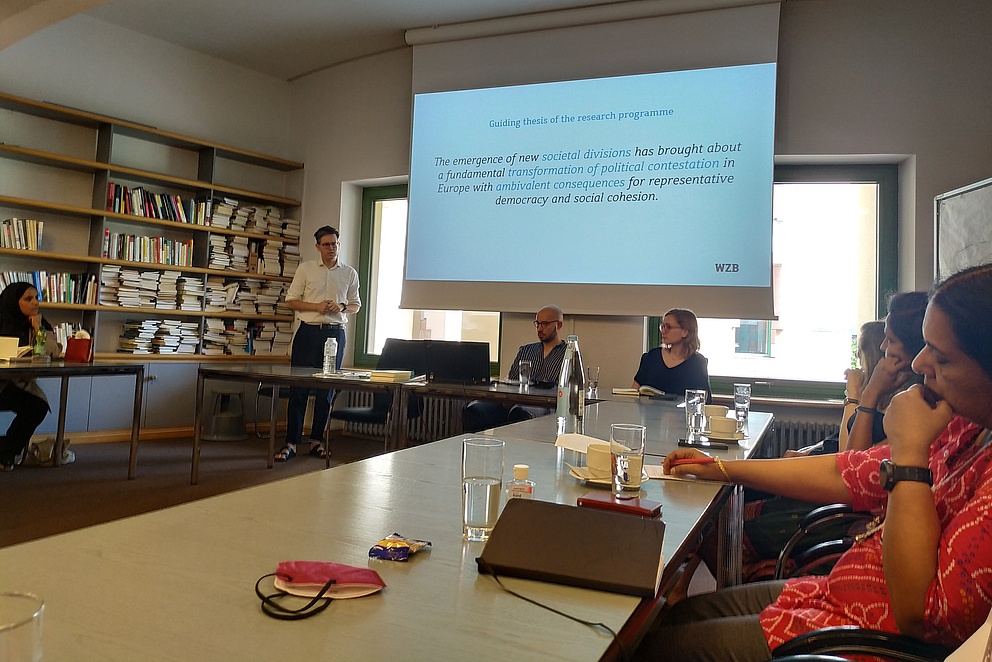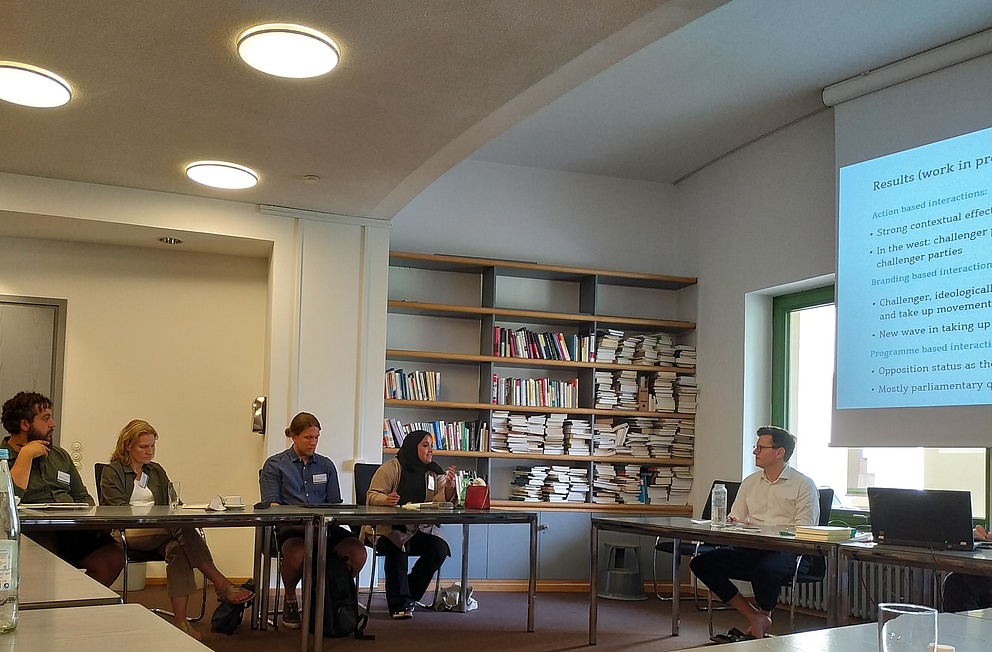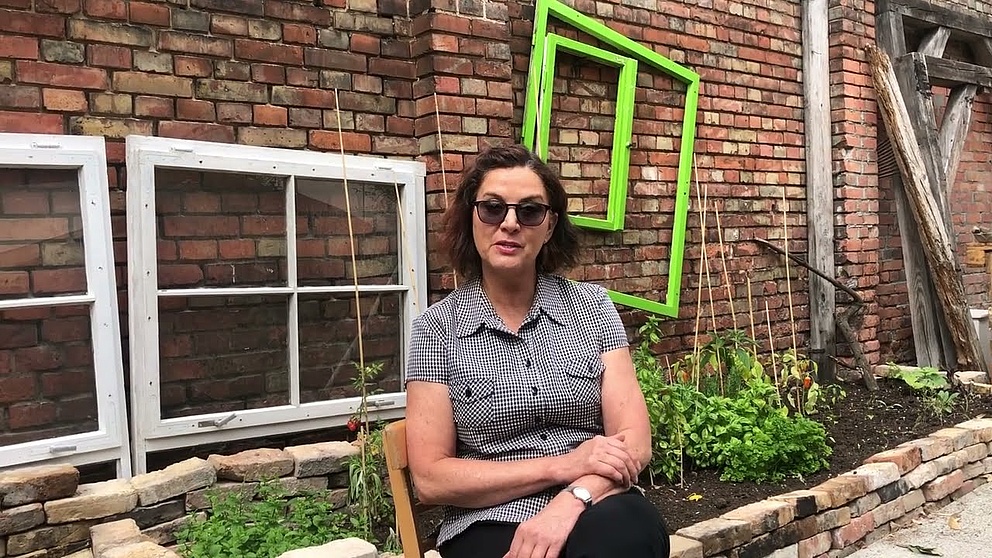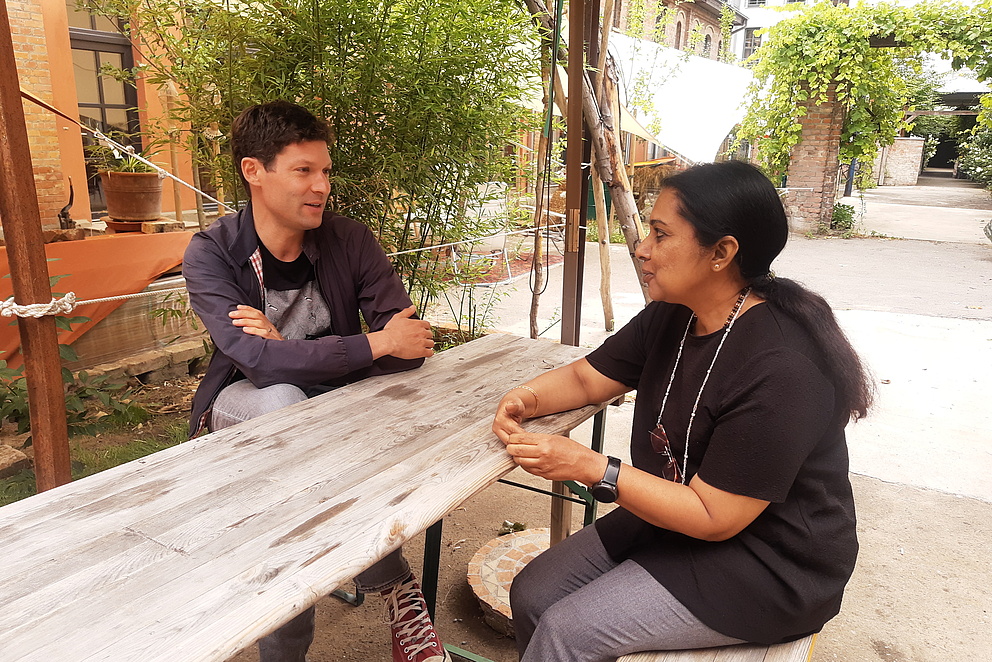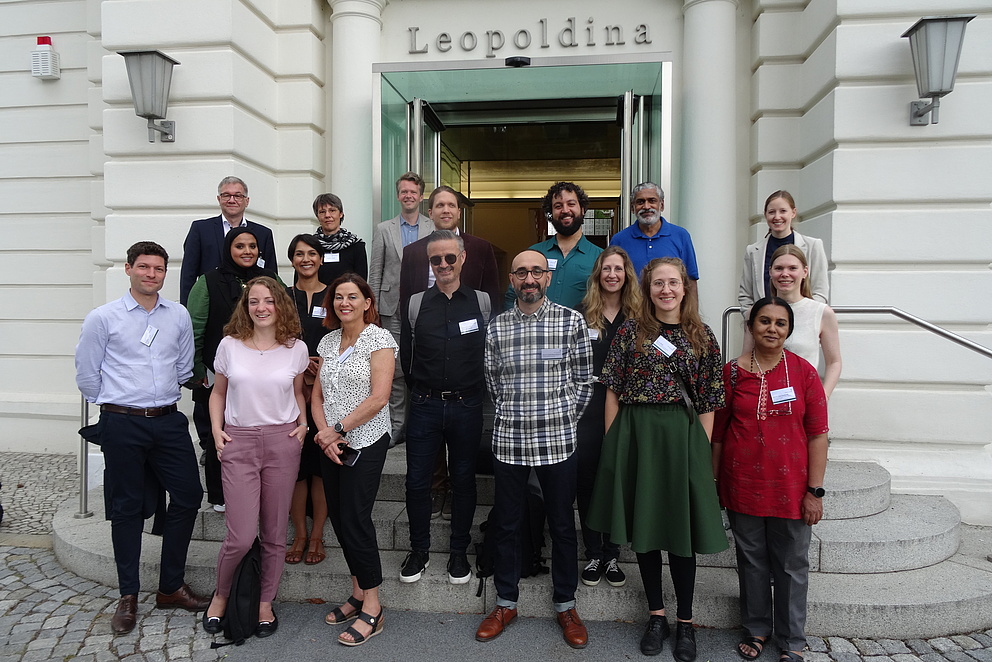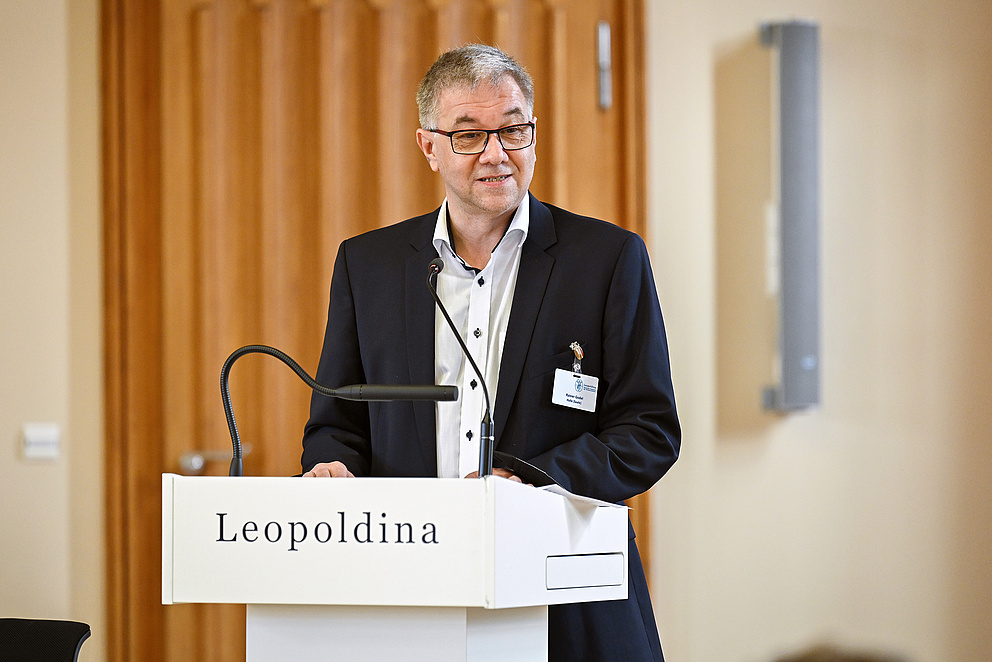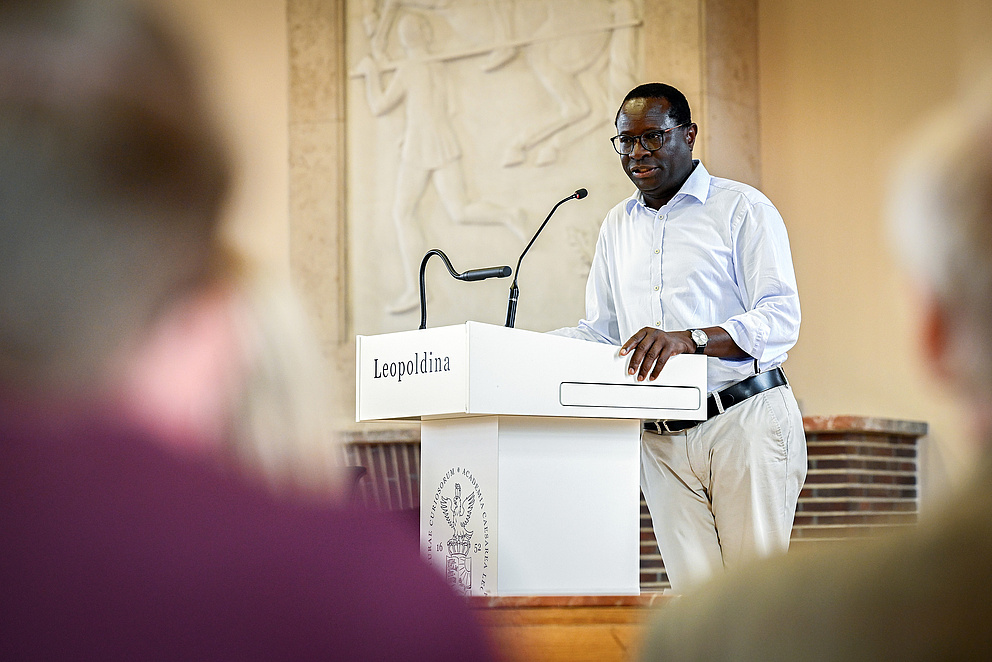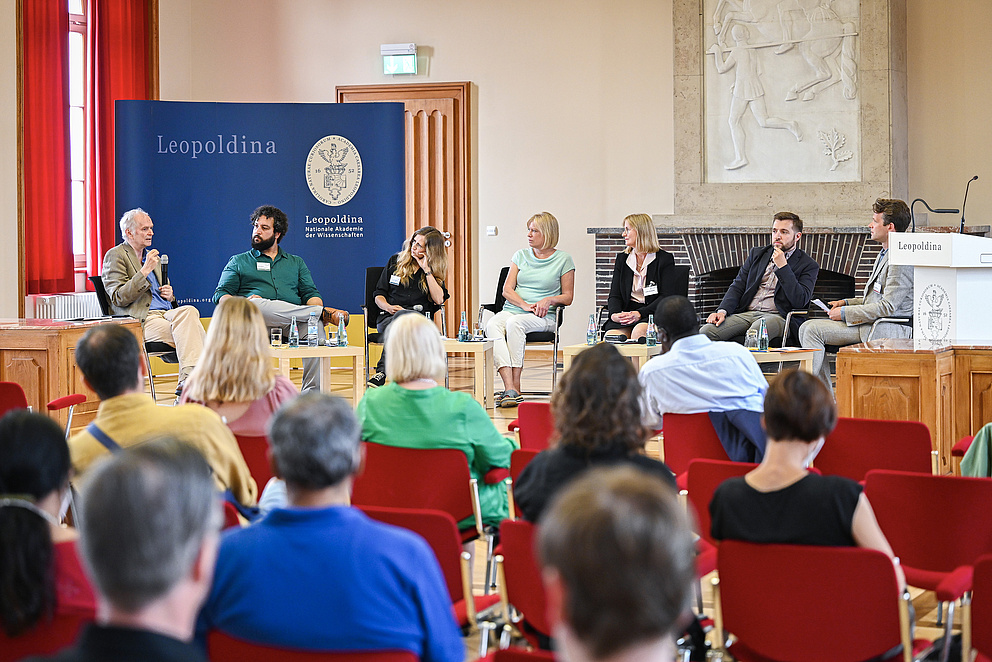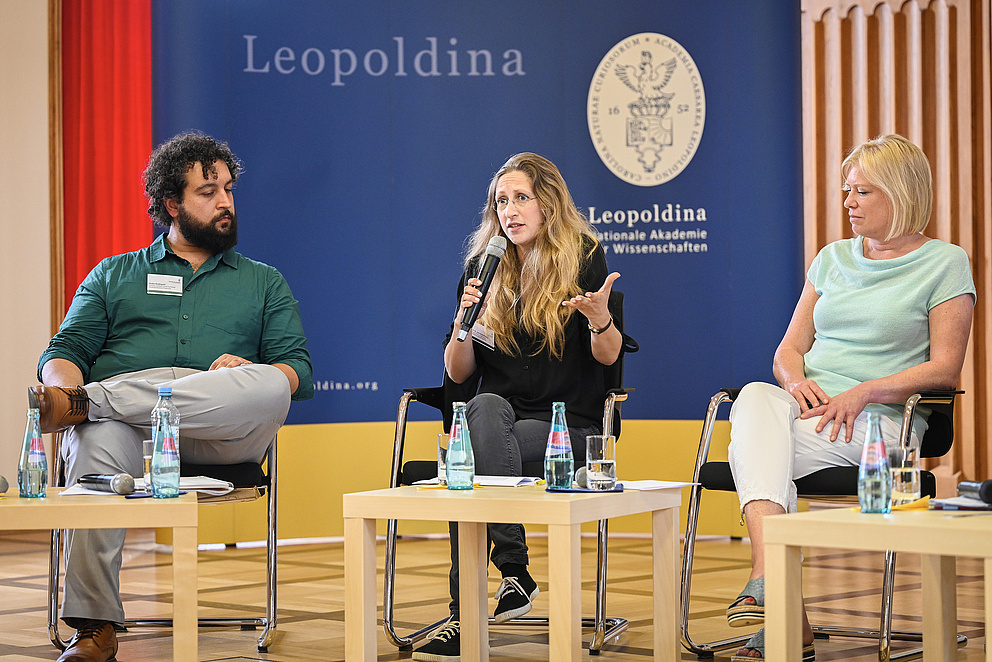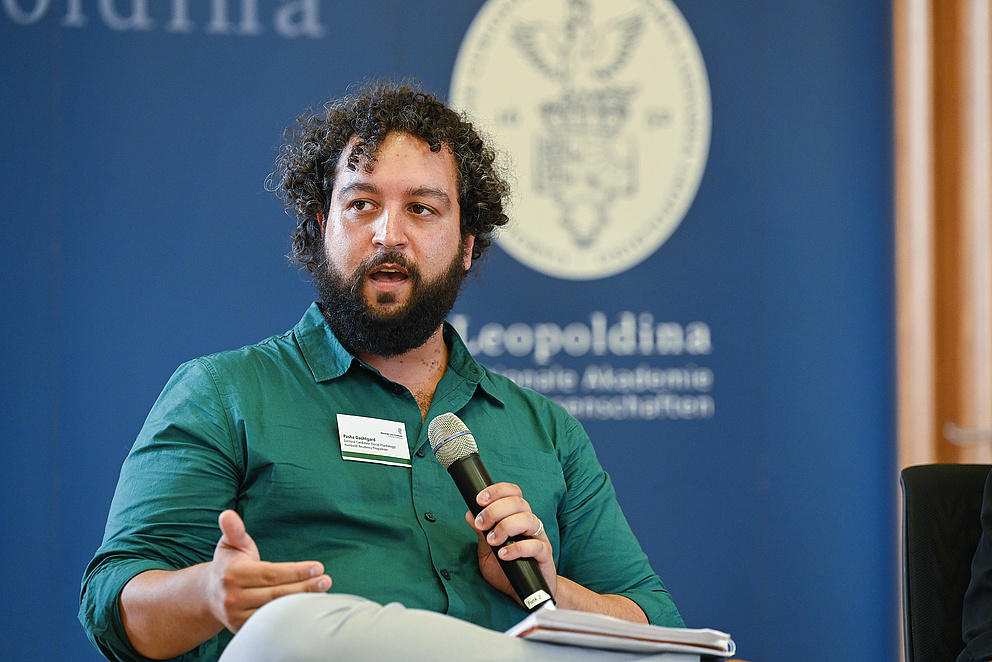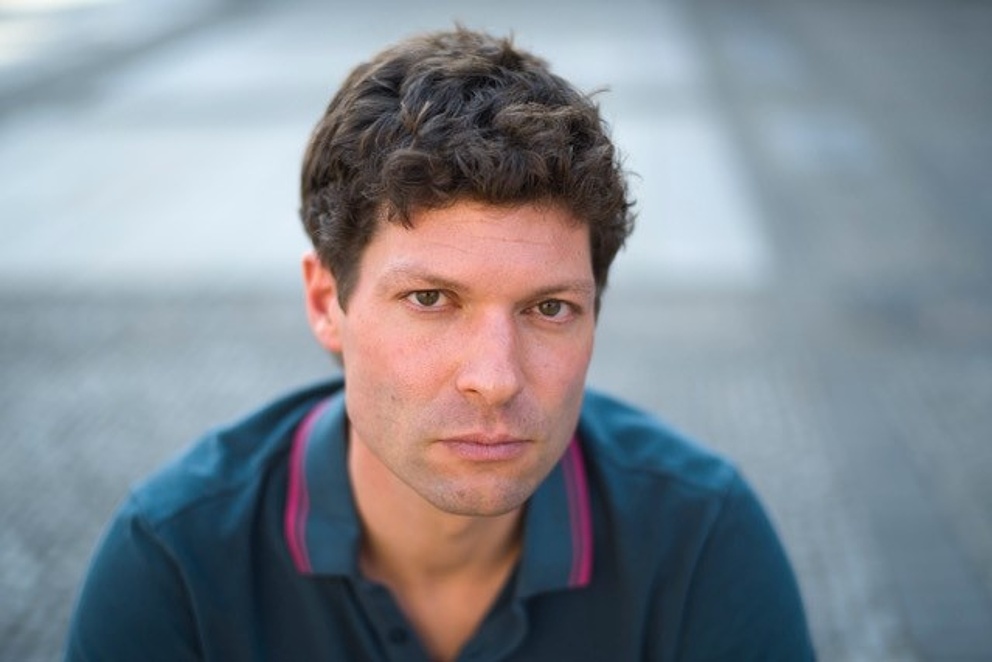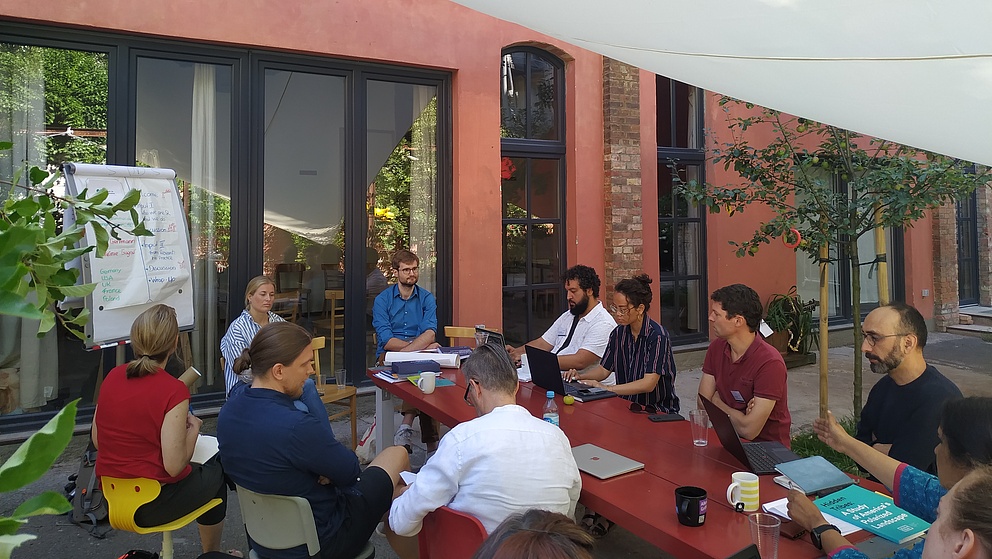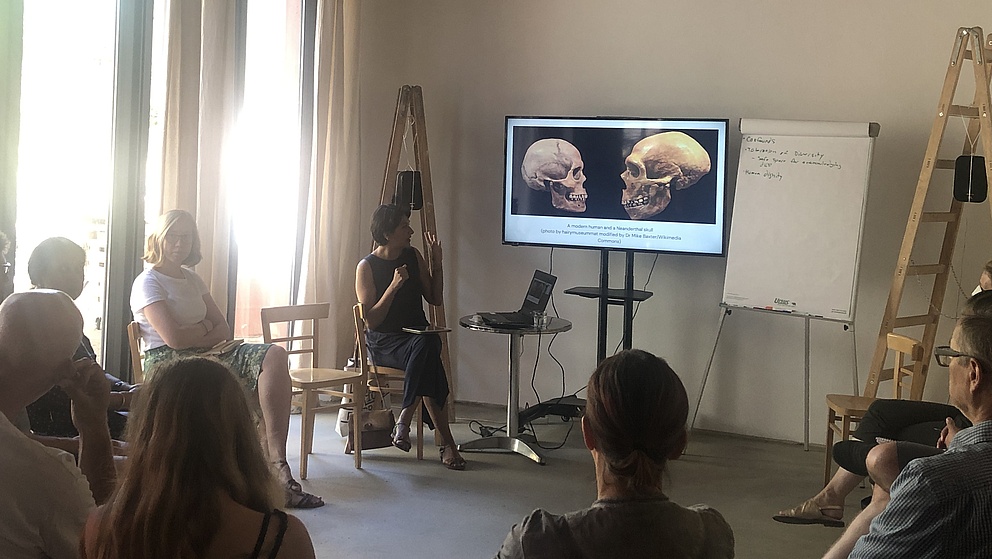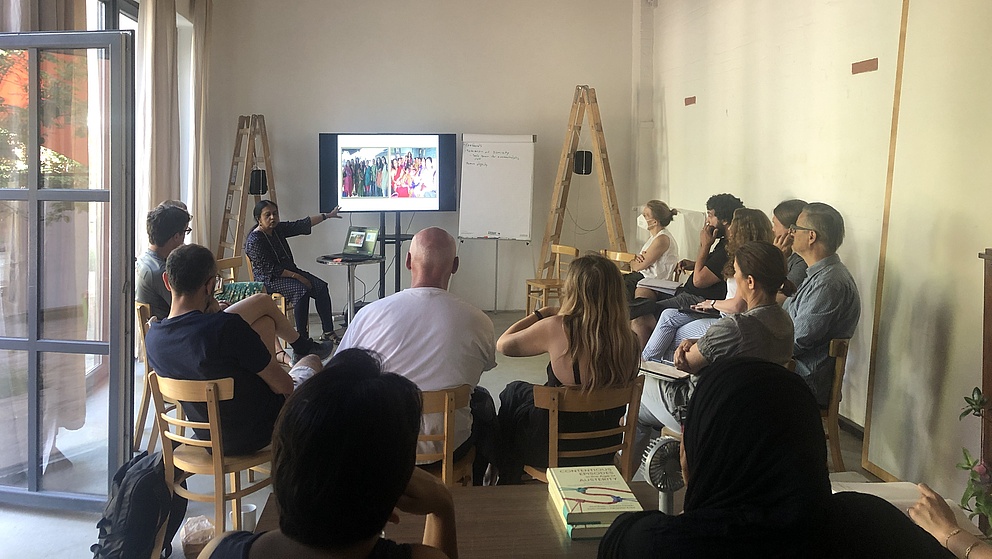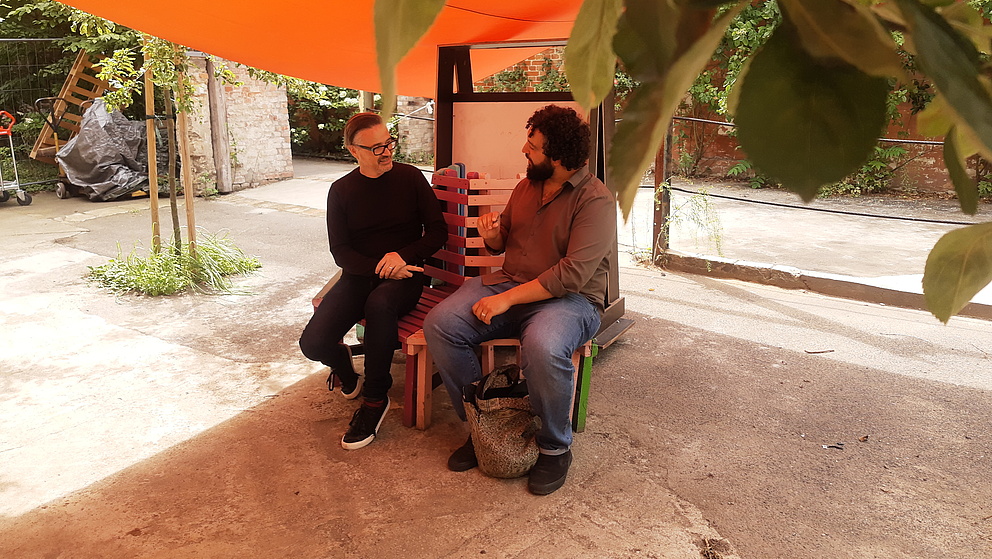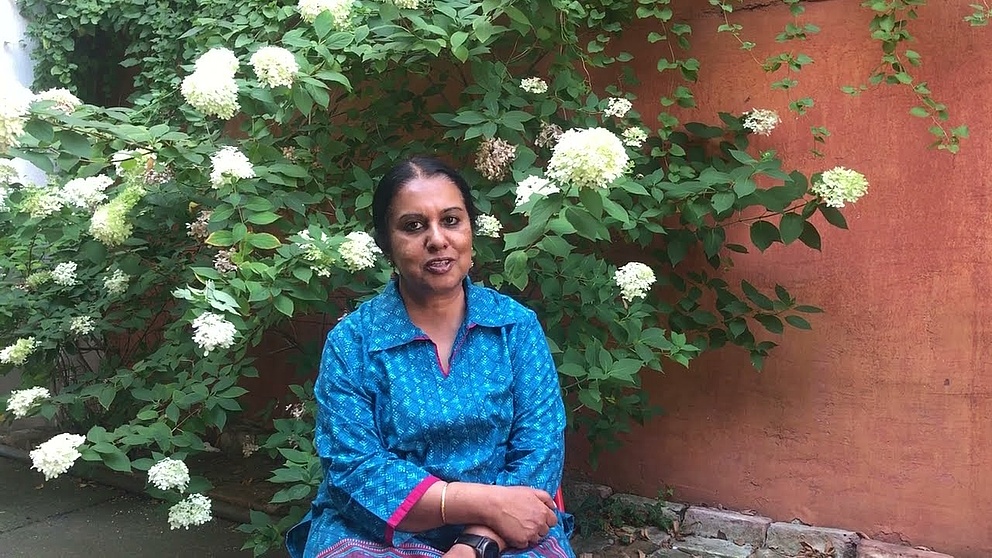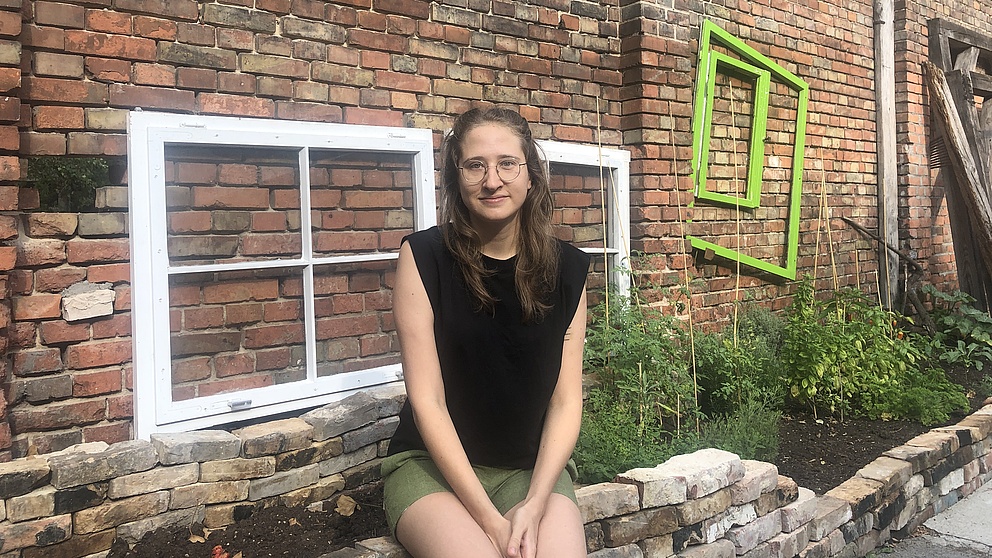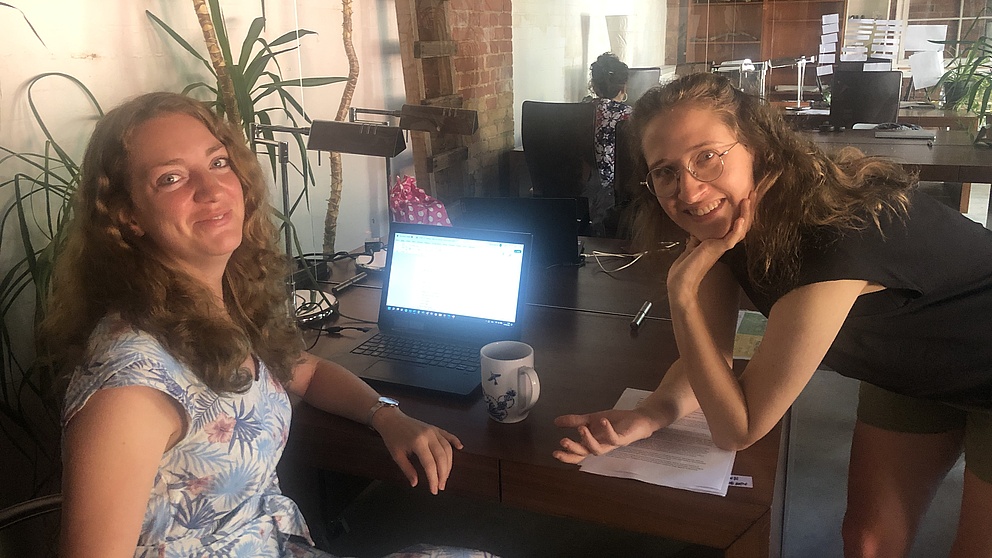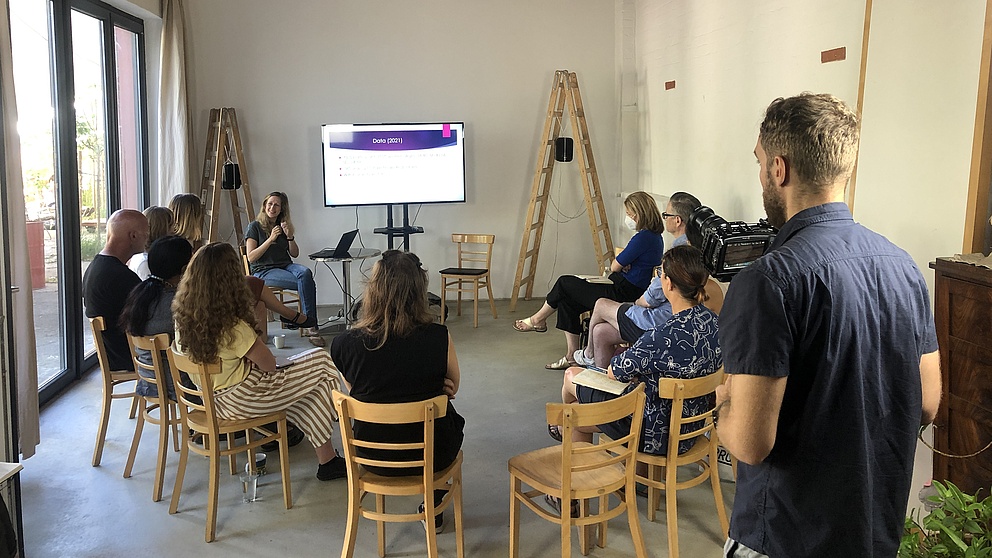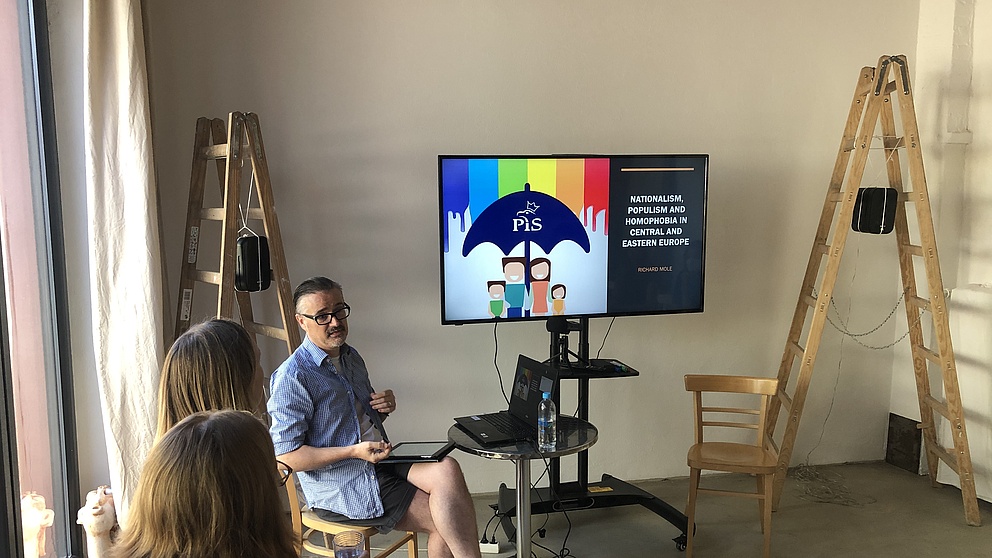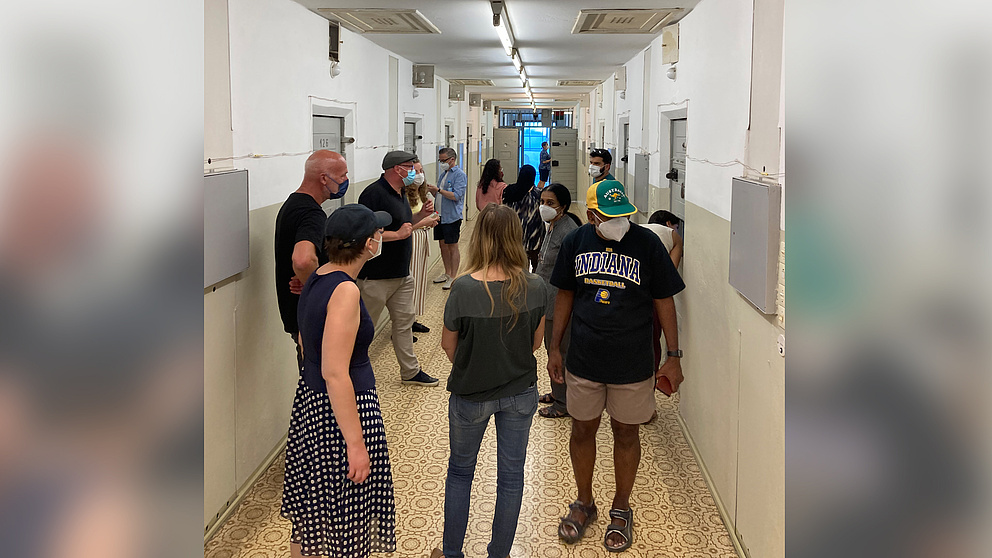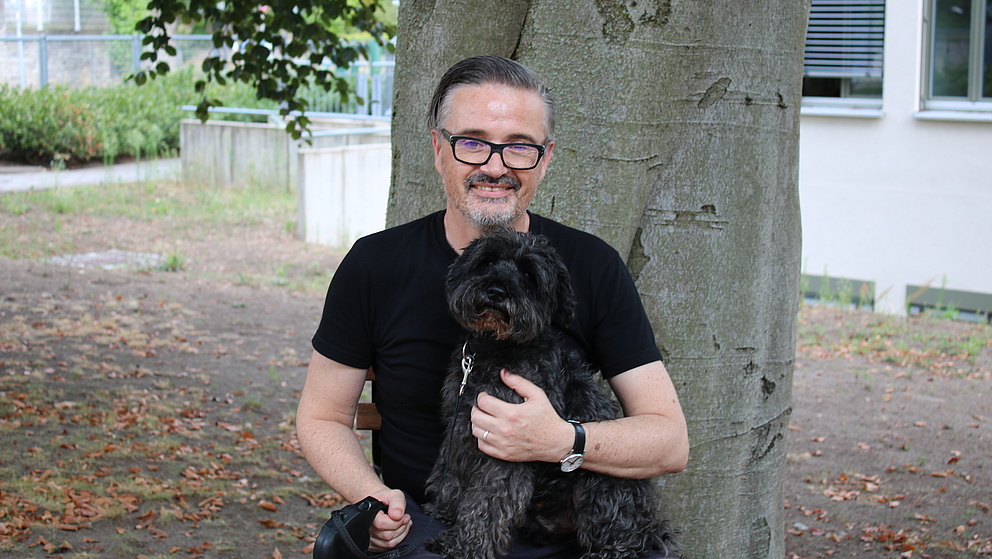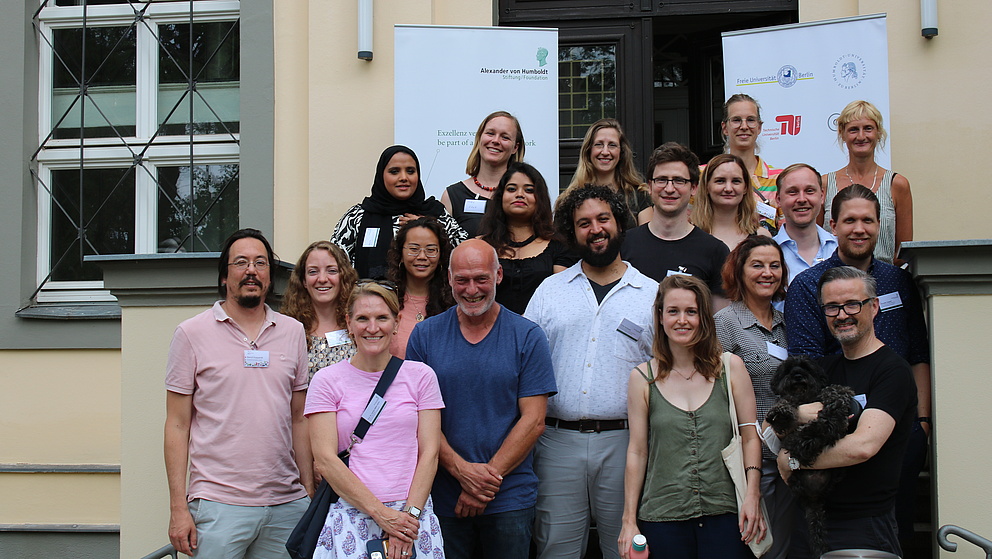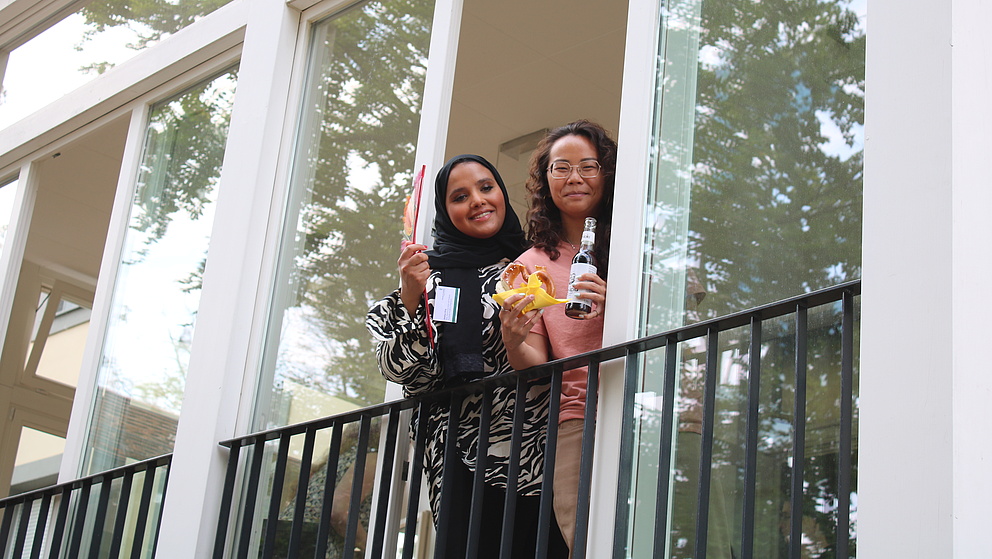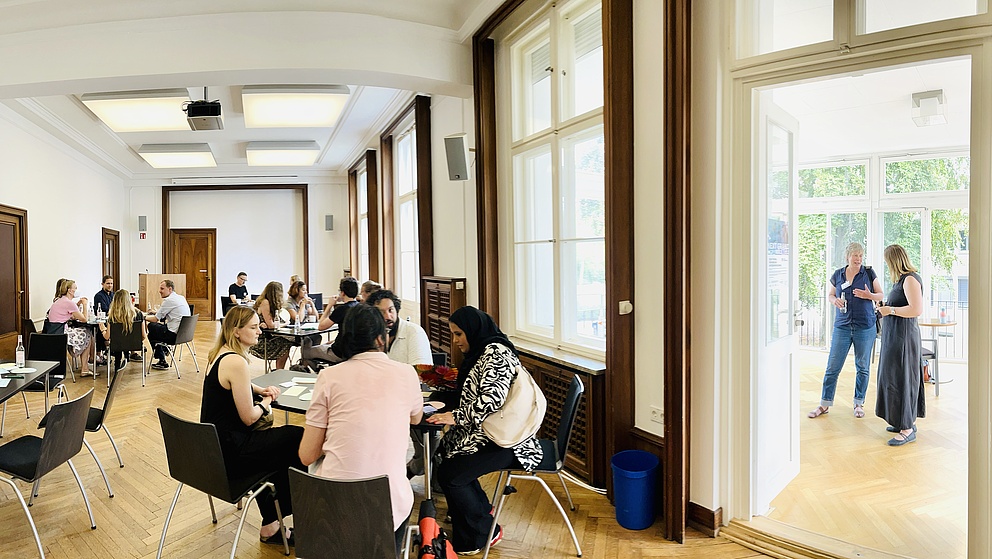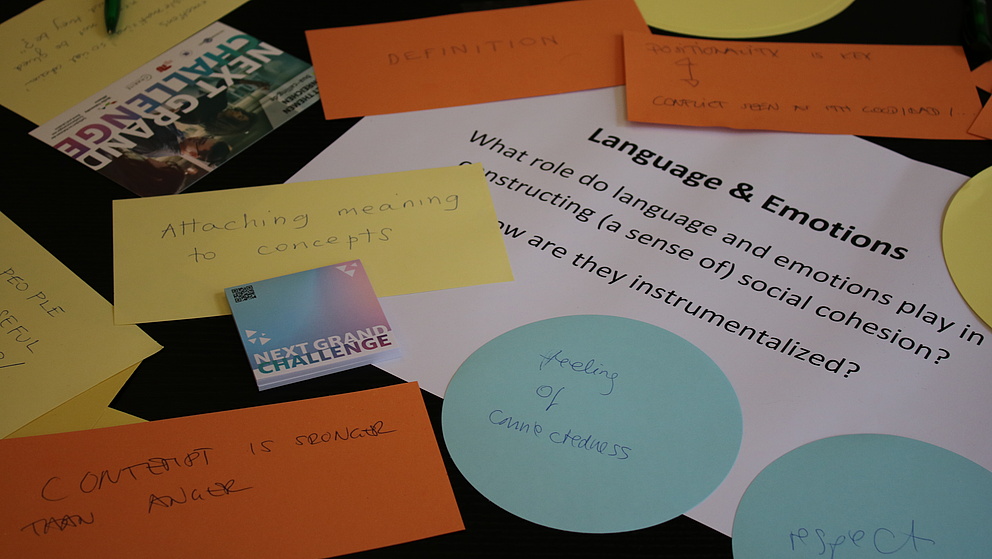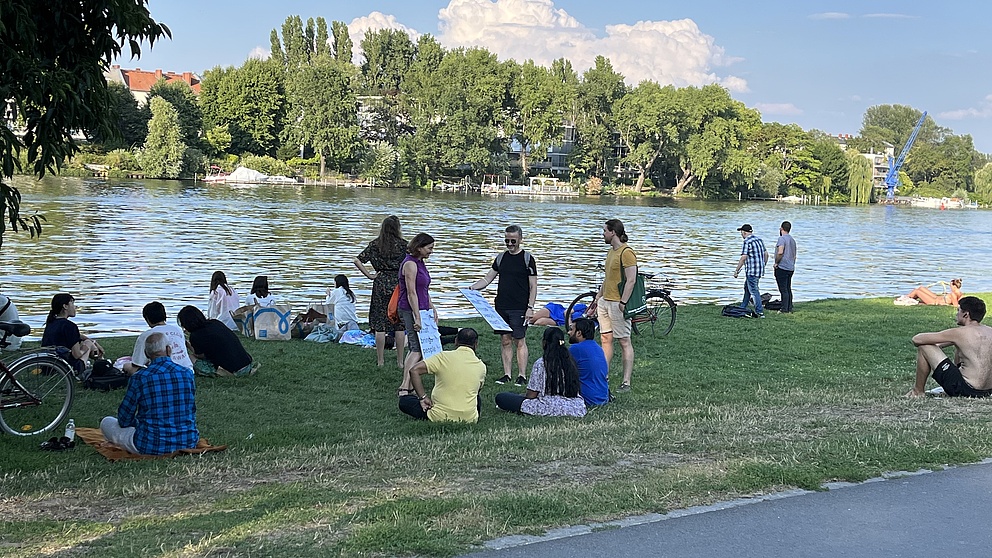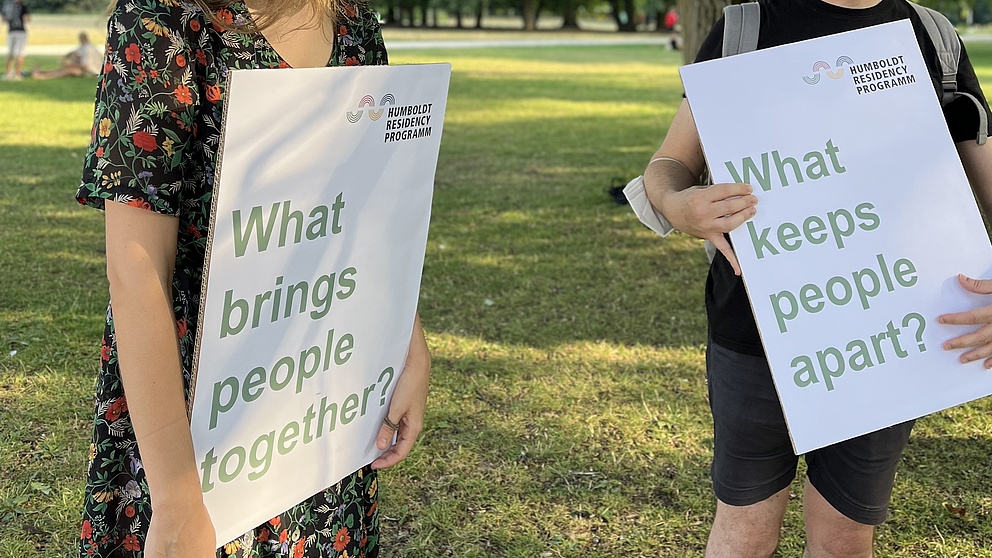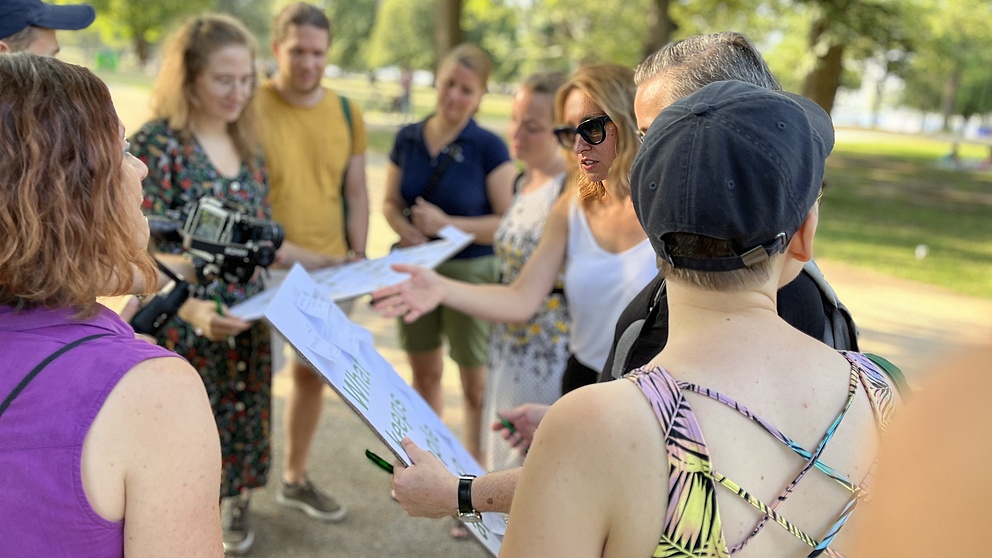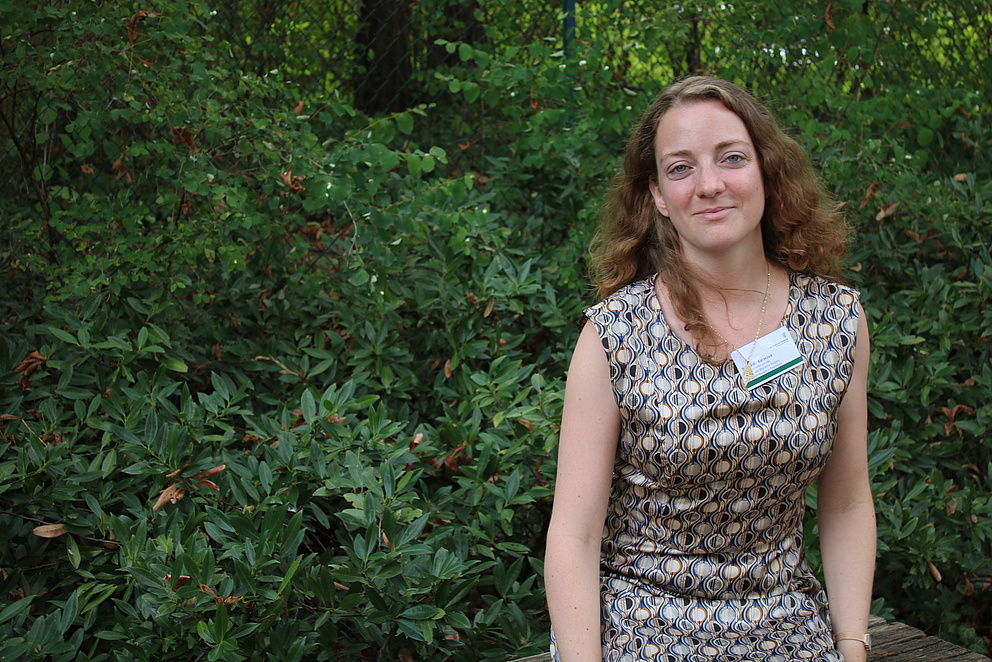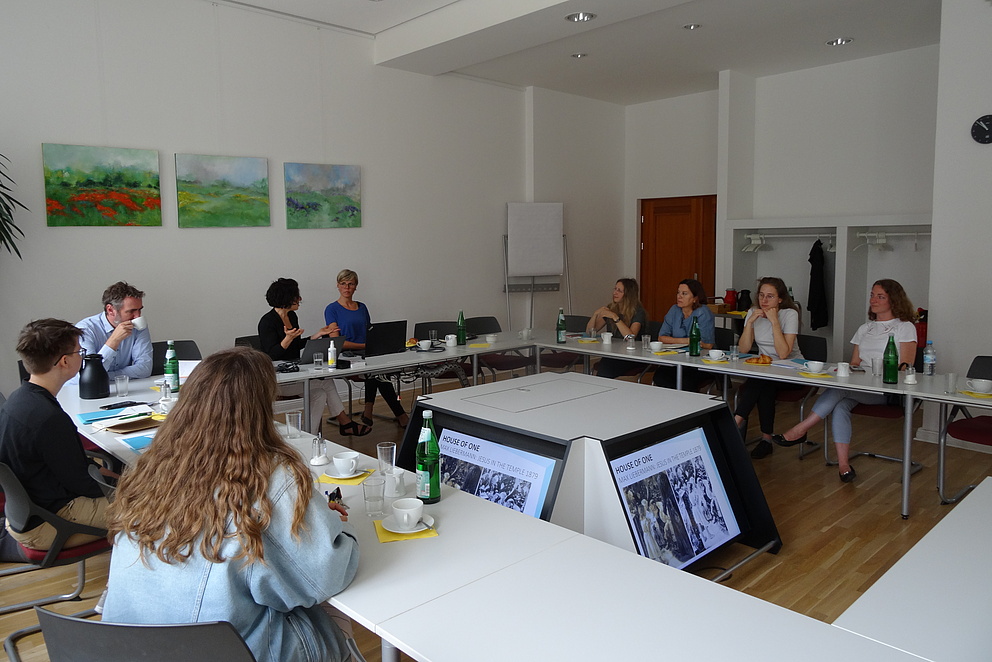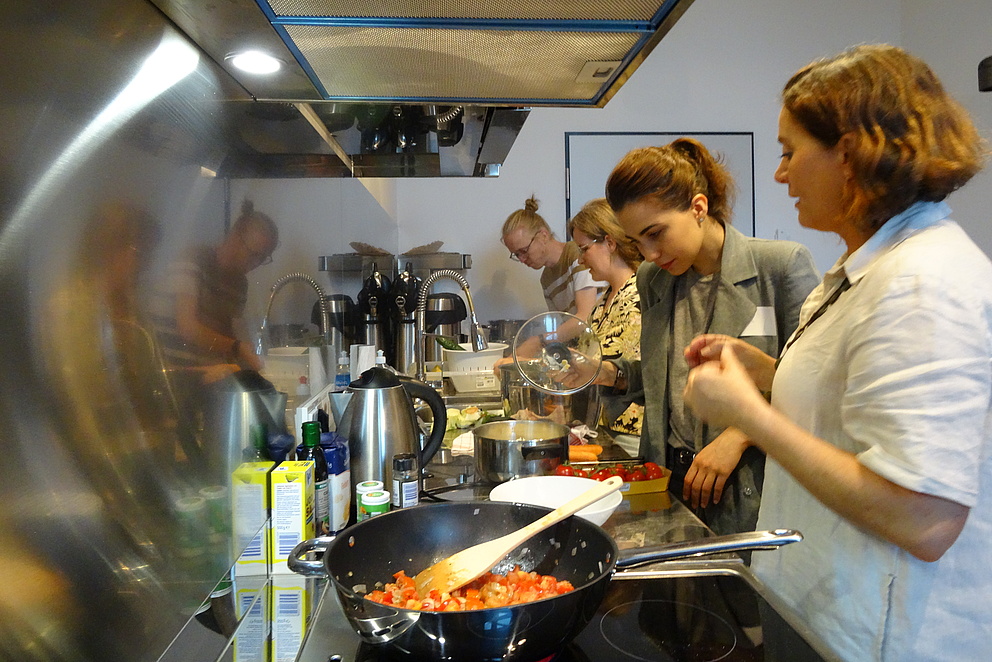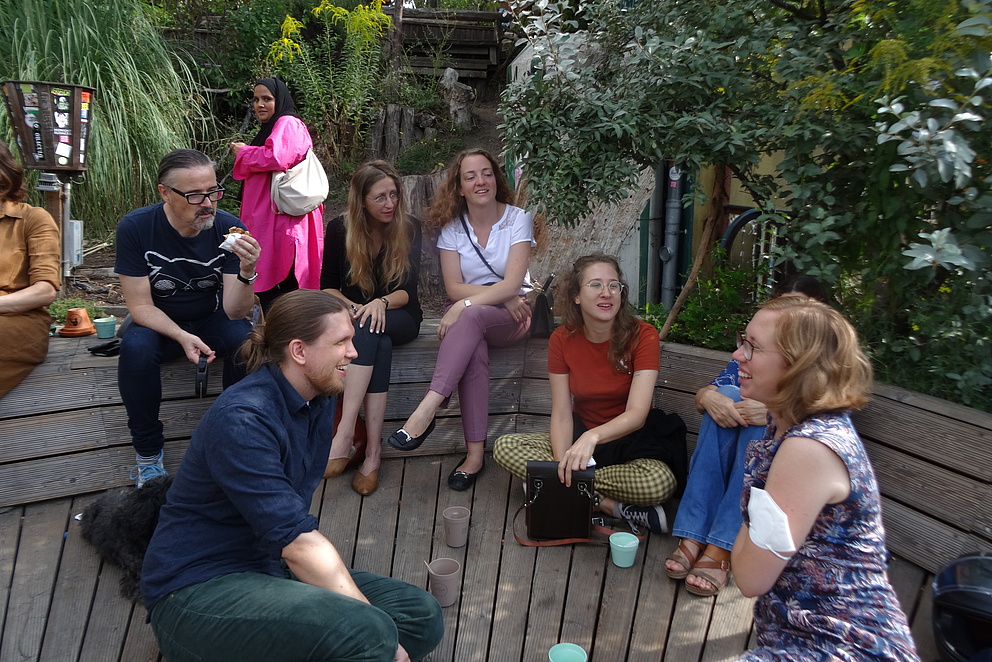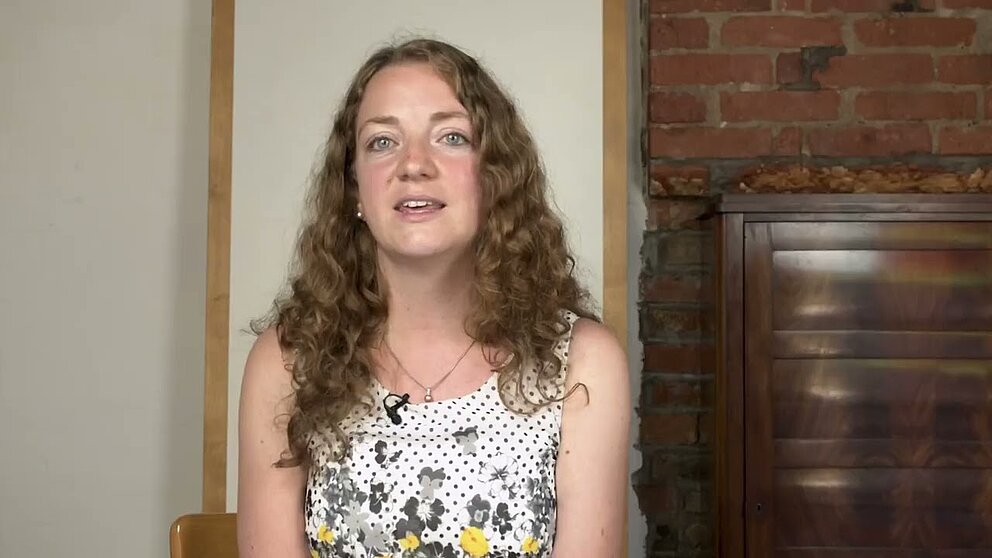Jump to the content
- {{#headlines}}
- {{title}} {{/headlines}}
Week I / 8 July 2022
Creative lead Dr. Cynthia Miller-Idriss about the first residency week in Berlin
Friday was a big day for the Humboldt Residency cohort and for me as its creative lead. I rode my bike across the city with another fellow to our fabulous co-working space, and together with the fellows and Humboldt Foundation project leads, we had a terrific brainstorming session about the kinds of structure that might facilitate our thinking and learning about various aspects of social cohesion. Already I can tell the collaborations and discussions will be rich and rewarding this summer. In the early evening, we were joined in the courtyard by the current 50 German Chancellor Fellows (PDF) who are spending a week in Berlin – young people from China, India, Russia, Brazil, and the U.S. who have been spending the past year in cities across Germany, working on individual research projects. As a former Chancellor Fellow myself, this was an especially nostalgic moment for me – 22 years after my own fellowship, to be standing back in Berlin with a new cohort who are full of energy, questions, and ideas about a wide variety of social problems and issues, was quite a special feeling. We had three roundtable sessions - set up across eight thematic tables - each of which ran longer than the intended time. There is clearly no end to how much this group can discuss and debate issues we care about! Excited for the weeks to come and to dig into practical, theoretical, and empirical discussions about social cohesion across national contexts, within local settings - and most importantly for me, what we might be able to do to strengthen it, as part of an overall charge to reinforce democracy.
Dr. Cynthia Miller-Idriss, Professor at the School of Public Affairs and School of Education and Director of the Polarization and Extremism Research and Innovation Lab (PERIL), American University Washington, DC
Week II / 15 July 2022
Dr. Alexander Stagnell, Postdoctoral Research Fellow in Rhetoric, Södertörn University and Université libre de Bruxelles
The first proper work week for the Humboldt Residency Cohort here in Berlin got off to a flying start. Already by lunch time on Monday, two discussion groups, one on ‘democracy’ and one on ‘gender and sexuality’, had finished their first meetings. And the rest of the week has followed suit . As is common when a new group with diverse backgrounds meet in person for the first time, the discussions often started out slowly. Everyone was a bit hesitant, not sure in what direction we were heading or on what topic we should focus our attention. But after just a few minutes, the conversations picked up pace: practical examples were coupled with theoretical reflections which, in turn, were tested against further empirical cases. Regarding the nature of our discussions, one of the members attentively noted that we all tended to focus our talks on the threats against social cohesion rather than the path towards strengthening it. Perhaps, as this colleague went on to point out, this was due to the nature of our respective work, primarily trying to understand and analyse problems rather than offer clear-cut solutions. But as a researcher in rhetoric, these discussions have also taught me a lot about how my colleagues understand social cohesion. To study rhetoric is to study the ways in which people understand the world and how they try to persuade others to see it in the same way. So, to begin with the problems that we associate with a notion like social cohesion, is probably the best possible way for us to initiate the kind of work we want to carry out during the residency. By listening to the other cohort members speaking about their work on topics relating to such things as conspiracy theories, democratic legitimacy, and extremism, I have started to see different notions of social cohesion taking form, arising out of the way in which a specific problem is constituted. Only in this way, I believe, are we able to think social cohesion as a proper concept. So, even though our first week has gotten off to a flying start, now is the time to work, work, work.
Alexander Stagnell has a PhD in Rhetoric from Uppsala University and is currently working as a Postdoctoral Research Fellow funded by the Swedish Research Council. His project “The Return of the Sophists? Democracy, Rhetoric, and Post-Truth in the Populist Moment” is co-hosted by Södertörn University and Université libre de Bruxelles and focuses on the figure of the sophist in political thought as a way of investigating the relationship between truth, rhetoric, and populism in contemporary democracy.
Week III / 22 July 2022
Christa Rautenbach, honorary treasurer of the Society of Law Teachers of South Africa, board member of the Commission on Legal Pluralism and the African-German Network of Excellence in Science
Why are a group of ten people from different countries and scientific fields researching the meaning and significance of social cohesion in a place such as Berlin? Stepping out of the U-Bahn at Hallesches Tor on the 1st of July, I partly got the answer to my question. Hallesches Tor is the gateway to the Kreuzberg district in Berlin. The internet portrays Kreuzberg as a “mixed neighbourhood” with a community of almost half of non-German descent. My first impressions of the area confirmed the internet descriptions. Indeed, it must be challenging to achieve cohesion in such diverse surroundings. One could not have asked for a better backdrop for what promises to be a great eight weeks of unravelling “social cohesion” mysteries.
The programme’s first three weeks went by in the blink of an eye. Week three was fully packed with lively debates and social activities. Two team members took the first plunge to present their plans within the programme’s framework. Cristóbal Kaltwasser, a political scientist, spoke about his research agenda and watered our tastebuds with his tentative thoughts on social cohesion in the context of populism. One of them is the rise of populism due to so-called “social cohesion deficits”, both in material and cultural terms. Also discussing her ideas was Lea Kuhar, a philosopher with detailed knowledge of Karl Marx and his work. She explained that she would look at social cohesion from a Marxist perspective in the coming weeks, especially his concept of Gemeinwesen. We had the opportunity to learn more about Marxism when a small group of us visited the fascinating “Karl Marx and Capitalism” exhibition in the Deutsches Historisches Museum.
On Thursday, we ventured outside our working environment to the WZB Berlin Social Science Center to learn more about their programmes and to talk to Professor Swen Hutter, Vice Director of the Center for Civil Society Research, and his colleagues about the different facets of political conflict and civil society transformation in light of past and current protest movements worldwide. We had lively discussions and they fully agreed with our preliminary observations that finding a common understanding of social cohesion will be challenging, if not impossible.
But the week was not only about work. One late afternoon, a few of us also endured the summer heat by strolling through Kreuzberg’s streets with a local guide to learn more about its history. Again, the surroundings confirmed my initial observation that we are in the right place at the right time to focus on those aspects that unite instead of divide us in our humanity. An African saying aptly recognises this – “I am because of who we all are” (ubuntu ngumuntu ngabantu).
Christa Rautenbach was formerly a state prosecutor and is currently a law scholar with the degrees B Iuris (cum laude), LLB (cum laude), LLM and LLD. She is the honorary treasurer of the Society of Law Teachers of South Africa, board member of the Commission on Legal Pluralism and the African-German Network of Excellence in Science, secretary of Juris Diversitas and former Ambassador Scientist of the Alexander von Humboldt foundation. Her fields of interests include legal pluralism, customary law, mixed jurisdictions, cultural diversity, judicial comparativism and the law of succession. She is the editor of the Potchefstroom Electronic Law Journal and chairperson of the advisory committee of the South African Law Reform Commission: Project 144 (Single Marriage Statute). She is also a former fellow of the Käte Hamburger Kolleg “Recht als Kultur” in Bonn.
Week IV / 29 July 2022

Participants of the panel discussion on right-wing extremism: Prof. Dr. Reinhold Sackmann (Institute for Sociology, Martin Luther University, Halle), Pasha Dashtgard and Dr. Julia Elad-Strenger (Humboldt Residency Programme), Esther Smykalla (International Office, Martin Luther University, Halle), Dr. Judith Marquardt (Councillor for Culture and Sports, City of Halle), Igor Matviyets (Association for Migrant Organizations, Halle) and Moderator Marcus Hoffmann (Programme Director, Alexander von Humboldt Foundation)
Ronen Steinke, journalist and author
The East German city of Halle is not only the seat of the German National Academy of Sciences, the Leopoldina, housed in a villa on a hill. The city is also the site of a right-wing terrorist attack which sent shock waves around Germany and around the globe less than three years ago. On 9th October 2019, a 27-year-old German Neonazi carrying a number of firearms had attempted to break into the city’s synagogue, where more than 50 people were congregating at the time for the highest Jewish holiday of Yom Kippur. The attack, inspired by and modelled on the attack in Christchurch, New Zealand, a few months earlier, failed. The attacker did not succeed in breaking in. Instead, he shot and killed a local woman who had happened to be passing by on the street, while he streamed the events live to an internet audience. He then shot and killed a customer at a Turkish kebab shop before being stopped by the police.
So the city of Halle was a topical place for the Humboldt Residency cohort to take its discussion on social cohesion further. At a public debate in the Leopoldina villa, cohort members Dr. Julia Elad-Strenger (Bar-Ilan University, Israel) and Dr. Pasha Dashtgard (American University, USA) exchanged views with local policymakers and wrestled with a fundamental question which is sometimes overlooked in an effort to ostensibly condemn extremism: What are the – often quite relatable – psychological mechanisms that drive people to embrace ideas of group-hatred in the first place? Julia pointed out: “Delegitimizing the other serves a function for groups.” It reinforces the feeling that one’s own group is positively distinct. Julia cautioned against attempts by government agencies to stigmatize those who hold such views. To devalue people who are seen as radical can back-fire, she explained. “It drives them deeper into radicalization.”
In a similar vein, Pasha advocated for an approach to radicalized groups that is less confrontative. “If you try and push people to address their ideology directly, they tend to retreat and harden their position.” He described the law enforcement centered approach to extremism taken by the relevant US agencies as counterproductive in some instances, since it can stigmatize Muslim communities and create new psychological needs for exactly the hateful narratives peddled by radicals. Instead, a strategy that has been seen to work better was described by Pasha as psychological “inoculation”. This method is designed to strengthen resilience beforehand. Emphasizing the importance – and power – of prevention, Pasha explained that this means warning target groups by telling them, for example: People are going to try and lie to you about vaccines… This debate, and the audience questions that ensued, illustrated the practical and sometimes ideological conflicts which serious efforts at defending vulnerable groups from hate crime cannot evade.
Ronen Steinke is a political editor with Germany’s leading newspaper, Sueddeutsche Zeitung (SZ), where he spends his days commenting on the work of politicians, mostly in the field of civil rights and anti-terrorism. By night he writes books which, to his joy, have hit the bestseller lists and sparked a number of political debates in Germany in recent years, centering on German history, antisemitism and criminal justice. Ronen went to university in Germany and Japan and holds degrees in law and criminology. He occasionally teaches legal history to judges and is currently working on a history of the German secret service. He moved to Berlin in 2017 and still thinks it’s lovely.
Week V / 05 August 2022
Mala Pandurang is Principal at Dr. BMN College, Mumbai and Humboldt Foundation’s Ambassador Scientist to India
On Sunday the 31st of July, Pasha, Richard, Meili and I set out on a hot Berlin summer afternoon for Mauerpark to get a feel of how a public engagement event would work at this spot loaded with history. We were joined by my husband Pandurang, Pasha's wife Sara, and their little daughter Laila adding to a sense of community that has evolved over the period of the Humboldt Residency Programme. As we walked around the flea market buzzing with Berliners and visitors to the city, we realized that it would be a challenge to engage visitors in a conversation on aspects of social cohesion in such a relaxed atmosphere. But we are excited to strategize together on the same project.
The highlight of the week was the workshop on Tuesday, August 2nd, with the NGO More in Common. The name of the organization immediately stirred my interest as since it relates to the ongoing debates on what brings people together against questions of what keeps them apart. Inga and Jérémie interacted with us for 90 minutes about how research can be translated into practice in a language accessible to civil society. They shared innovative material designed to strengthen commonality in times of division and polarization and to encourage collective action.
The presentations by cohort members in the week continued to offer multiple perspectives on inter-disciplinary approaches to the concept of social cohesion from specific contexts as well as geo-political and cultural locations. Cynthia Miller-Idriss invited the group to critique a working paper that attempts to analyze the contentious debate on enforced notions of social cohesion as being more harmful than effective. Pasha Dashtgard offered insights into processes of interventions practiced at the Polarization and Extremism Research Innovation Lab at the American University, Washington D.C. Angela Saini presented her work on racial discourses in science history and practice, showing us how ideas of race have shaped mechanisms of exclusion in different areas of life. My presentation focused on issues of diversity among student groups and the possibility of using literary interventions to make the campus more accepting of pluralism.
We continue to bond while we have a quick lunch in the outdoor spaces at PulsRaum, bump into each other at the coffee machine, commute together on the U-Bahn and shop for groceries on our way back to the apartment. These are friendships that will continue to evolve even after the official residency ends.
Mala Pandurang is Principal at Dr. BMN College, Mumbai. She was a postdoctoral fellow of the Alexander von Humboldt Foundation at the Otto-von-Guericke Universität, Magdeburg. She is currently the Foundation’s Ambassador Scientist to India. Her research grants include Fulbright Visiting Professor at the University of Texas at Austin, recipient of Charles Wallace Research grant to the UK, major research grant from the University Grants Commission (New Delhi), Dr. Tikekar Research Fellowship from the Asiatic Society of Mumbai, and Inlaks Fellowship in Social Sciences from the Asiatic Society of Mumbai. She is series editor of the Postcolonial Lives and is a member of the Editorial Board of the Journal of South Asian Diaspora. Her training is in literary and culture studies.
Week VI / 12 August 2022
Lea Kuhar, philosopher
In the sixth week of the Residency Programme, we continued with the individual presentations of the research work and artistic practices carried out by our cohort members. Four of the members presented their work on past and current projects. Christa Rautenbach talked about the role of law in the building of the South African state, especially during the times of the apartheid. She posed the question whether that same law that enabled the old system can be applied to the formation of contemporary democratic state. Amina Atiq showed us some of her projects in which she actively engages with the public by practicing different forms of art. In her work she addresses a broad spectrum of topics, including the unheard voices of the Yemeni community, different forms of bridging national borders, and the power of storytelling regarding migration, racism and islamophobia. Julia Elad-Strenger addressed the question of different cleavages in contemporary Israeli society. She presented some of the data of her ongoing study about different forms of conflicts and discussed the possibility of social cohesion within the religiously, ethnically and politically divided Israeli society. Richard Mole took us on the journey of his academic biography that started with his studies on nationalism and is now focusing more broadly on different relationships between identity and power, sexualities and migration. His talk focused on a case study of LGBT+ rights in eastern European countries and the challenges the activists are facing in right-wing conservative states, such as Poland.
Wednesday was the busiest day of the week. After the research presentations in the morning, some of the members of the cohort gathered in a room on the second floor of our co-working space in order to record the last part of the podcast series. In this episode we were addressing the question “How can arts and culture help us imagine a truly cohesive society?”. Later in the afternoon we took part in a guided tour through the Berlin-Hohenschönhausen Memorial, the site of one of the most notorious political prisons of the German Democratic Republic.
During the week some of the members of the cohort also finished the preparations for the project Residency in the Park that will take place on August 16th in Treptower Park. In an attempt to engage with the broader public and get insights on debates and opinions among Berliners, we invite the visitors of the park to explore two questions: “What keeps people apart?” and “What brings people together?”. The upcoming event is a perfect opportunity for everyone to meet our members in person and engage with us in a discussion.
I hope to see you all in Treptower park (Rosengarten, close to the harbour), next Tuesday at 5 p.m.!
Lea Kuhar is a philosopher. Between 2016 and 2020 she worked as a young researcher at the Institute of Philosophy ZRC SAZU, Ljubljana. During this time, she received a DAAD grant to realize a part of her research at the Universität der Künste, Berlin. Her research interests are related to Marxism, epistemology, and contemporary political philosophy. In 2020, she defended her doctoral dissertation at the Postgraduate School ZRC SAZU on the topic of objects in Marx’s critique of political economy. She is a former member of the Programme Committee of the Institute for Labour Studies, editor of several scientific monographs, and author of several scientific articles published in national and international journals. Currently, she is working as an independent researcher.
Week VII / 19. August 2022
Richard Mole, Political Sociologist
Even though we are slowly approaching the end of the Berlin residency and had to say goodbye to another Fellow (Tschüss, Mala!), week seven of the programme was very busy in terms of research presentations, public engagement activities, networking and, not least, socialising. We kicked off the week with the final two presentations: Nikola shared with us her research on individuals who sought asylum in the socialist states of Central and Eastern Europe, problematising the widely held belief that the communist bloc was exclusively a producer of refugees. In many ways the communist states’ integration policies towards the ethnically diverse refugees were more progressive than the assimilationist approach adopted by many Western countries at the time in that the new arrivals in Czechoslovakia, for instance, were encouraged to maintain the cultural and linguistic identities of their original homelands. In her presentation, Malika explained the similarities and differences between two different extremist groups: white supremacists and supporters of ISIS (Islamic State of Iraq and Syria). Asked to imagine the sort of questions that gatekeepers to white supremacist groups would pose to potential members, the Fellows were surprisingly good at putting themselves in the shoes of racist extremists. As a scholar of gender, I found it particularly interesting that the two quite different groups had very similar views about the role of women in their idealised societies.
On Tuesday afternoon we all headed to Treptower Park to try out a new way of engaging the public on the issue of social cohesion. Armed with two signs reading ‘What brings people together?’ and ‘What keeps people apart?’, we approached unsuspecting Berliners enjoying the afternoon sunshine and asked them for their answers to the questions. Hardly anyone refused to engage with us and we received a lot of very interesting responses. Politics and religion were perhaps the most frequently given answers to the question ‘What keeps people apart?’ but other interesting responses included ‘miscommunication’ (from an Italian couple on holiday – at least, I think that’s what they said) and ‘fighting over girls’ (from a group of teenage boys playing football). The main factors thought to bring people together were love, culture in its various forms, and food and drink.
The following day we headed out to the Free University to meet the Principal Investigators and post-docs of the Berlin University Alliance’s Grand Challenge Initiative on Social Cohesion. We broke off into small groups to share our expertise and discuss various aspects of social cohesion, including the role of language and emotions and of art and culture. As a reward for our intellectual and networking endeavours, we enjoyed tea and cake in the back garden.
Acting on the input from the participants in Treptower Park about the importance of food and drink in bringing people together, we spent Thursday evening at a beer garden in Wedding, enjoying a variety of local libations and food prepared by the Humboldt Fellows. A special shout-out to Alexander’s Brazilian beijinhos and Christa’s South African meat balls, which were a particular favourite of my Schnauzer, Django!
Richard C. M. Mole is a Political Sociologist from UCL School of Slavonic and East European Studies (SSEES), London. He was a Humboldt Research Fellow in Berlin in 2011 /12 and 2016. A paper he wrote at the time received an award from the British Association for Slavonic and East European Studies in 2020.
Week VIII / 26 August 2022
Nikola Karasová, Research Fellow at the Masaryk Institute and Archives of the Czech Academy of Sciences
Our last week of the Humboldt Residency Programme has ended. We will soon depart from Berlin and return to our homes, families, and the everyday professional lives we left behind two months ago. This realization makes us reflect on what this shared experience gave us. How did our intense joint discussions shape us and our perceptions of societies? What changes and new insights will our exciting exchanges of ideas with people from various cultural backgrounds and life experiences bring to our work? Will it alter our perspectives and even open new creative paths for us to take?
For most of us, the change already happened over the summer when we voluntarily abandoned our intellectual comfort zones, trying to go beyond our own understanding of social cohesion. Challenging ourselves in a friendly circle of like-minded people made us realize how we can, as a group and as individuals, contribute to the broad debate on what brings people together and what sets them apart. Drawing on cases from various contexts and situations helped us understand the causes, mechanisms and consequences of social cohesion and dissolution, which we can further develop in our work.
For me, this week’s visit to the House of One belonged to the most exciting highlights of our summer programme. The Berlin grassroots organization aims to construct a building to host the world’s three monotheistic religions under one roof and engage them in interreligious dialogue. We discussed the benefits and challenges of this unique cultural project in bringing up social cohesion in religious terms and finding ways to combat extremism and support tolerance. I was particularly impressed by the architectural design of the future construction. By providing each religion its own space and a central room allowing for mutual encounters, the project promotes the concept of peaceful coexistence and mutual exchange of beliefs and ideas in a neutral and safe environment.
On tuesday, our colleagues Julia Elad-Strenger and Christa Rautenbach took part in an event that was equally exciting. ‘Polis kocht’ is an ongoing event series organized by Polis180, a grassroots think tank that offers an informal exchange with experts and policymakers while cooking and eating together. And, of course, the topic under discussion was social cohesion. Christa focused on how we can use the law to integrate and represent diversity, while Julia discussed the motivations of individuals to convene in groups from a psychological perspective. Now, you probably wonder what was on the menu. Christa prepared excellent South African Paptert (porridge pie), and Julia taught everyone to cook Israeli pasta with creamy yogurt-pea sauce.
With the cooking session being the last event in our joint residency calendar, we reconvened on thursday for a farewell meeting at the bank of the river Spree. We enjoyed our last moments together with a cup of coffee and fresh cinnamon buns, engaged in a vivid conversation. We became close in the last two months, so saying goodbye was not easy. However, there is still work ahead of us, as we will continue meeting virtually. And we all hope that one day we will meet again in person!
Nikola Karasová is a Research Fellow in the ERC project “Unlikely refuge? Refugees and Citizens in East-Central Europe in the 20th century” at the Masaryk Institute and Archives of the Czech Academy of Sciences. She investigates refugees to Cold War Czechoslovakia, focusing on the social history of refugeedom, humanitarianism, and citizenship. Having specialized in political extremism, populism, and conspiracy theories in Greece, she earned her PhD in 2021 from Charles University (Prague, Czech Republic) and Aristotle University (Thessaloniki, Greece). She joined the COST Action Comparative Analysis of Conspiracy Theories (2016-2019) and the project “Beyond Hegemonic Narratives and Myths. Troubled Pasts in the History and Memory of East-Central and South-East Europe” (2017-2019).

